































































Vol. 1. No. 1, Apr-Jun 2023 Jointly Published by :
Story Sustainability
Cover
and Palm Oil’s Future
West African Palm Oil Smallholder Farmers Tap into U.S. Market
RM 10/ USD 5
Top 10 African Countries Producing Palm Oil















Rotary Brush Strainer

Automatic Desanding Cyclone System
Circular Vibro Separator
Specialised In Replacement
Parts
Clean Energy for A Better Future

Steam Turbine
Single / Multi Stage

- Back Pressure Turbine

Multi StageCondensing

Palm Kernel Oil Machine
Palm Kernel Oil Filter
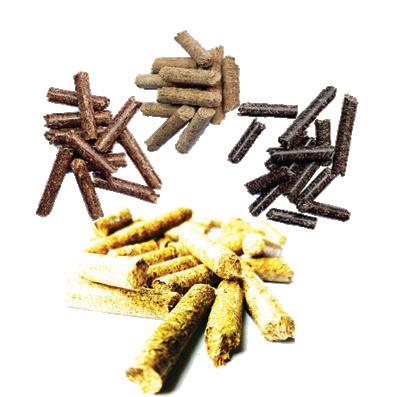
KCP Dust Collecting System

KCP Monitoring System

Screw Press
Biomass Palleting Plant


Biomass Fuel
Drying System
Auxiliaries Equipment

Decanter
Separator (High Speed) Purifier

Susan Tricia Editor

The Malaysian Palm Oil Board (MPOB) has signed a memorandum of understanding (MOU) with the China Chamber of Commerce for the Import and Export of Foodstuffs, Native Produce, and Animal By-products (CFNA) too enhance trade and cooperation between Malaysia and China in the palm oil sector while promoting sustainability and responsible business practices. This is as it’ll help China’s participation in the technological exploration of oil palm mechanization in Malaysia.
This collaboration is also said to promote the exploration and implementation of new technologies such as 5G, artificial intelligence, Internet of Things (IoT), and also autonomous vehicles in oil palm plantations. This is particularly in the areas of palm oil production, processing, and certification. Hopefully this MOU will expedite the promotion of Malaysian palm oil in China through joint marketing activities, trade fairs, and other promotional events.
This year will see Malaysia Palm Oil Expo taking place in Dewan Hakka Sandakan, Sabah from 20th to 21st June 2023 by our sister company, NRG Exhibition. This event will bring together an international congregation of both upstream and downstream companies showcasing the latest development in the palm oil industry. See you there!
On behalf of the editorial team, thank you for your continuous support of Palm Oil Today Africa Magazine. Stay in touch with us at www.africapalmoil.com and follow us on Facebook and LinkedIn for more updates.


PUBLISHER
FBI Publications (M) Sdn. Bhd.
PUBLICATION MANAGER
Vanny Lim vanny@asiafbi.com
MARKETING COMMUNICATION
Nur Izyan binti Dzulkifli izyandzul@asiafbi.com
ASSISTANT EDITOR
Atthira Zawana atthirazawana@fasiafbi.com
CREATIVE DESIGNER
Muhammad Fadzil design@asiafbi.com
BOARD OF DIRECTORS
Kenny Yong
Susan Tricia
OFFICIAL MAGAZINE OF
JOINTLY PUBLISHED BY
FBI PUBLICATIONS (M) SDN BHD (1168942-P)

Unit 9-3, Jalan PJU 5/6, Dataran Sunway, Kota Damansara, 47810 Petaling Jaya, Selangor. Tel: (+603) 5636 1952
ZENITH EXHIBITIONS LTD

Lagos, Nigeria, NG Tel: +234 809 115 5699
PRINTED BY
TOUCH PRINT ATMOSPHERE GLOBAL SDN. BHD. (1353914-P) No 72 & 77, Jalan PBS 14/3 Taman Perindustrian Bukit Serdang, 43300 Seri Kembangan, Selangor Malaysia.
ENDORSED & SUPPORTED BY
DISCLAIMER
The assertions and opinions expressed in articles and announcements on this magazine reflect the views of the author(s) and do not (necessarily) reflect the views of the publisher. Asia Palm Oil Magazine can in no way be held responsible for the content of such views nor can it be held liable for any direct or indirect damage that may arise from such views.
The information in this magazine is regularly supplemented and/or modified. Asia Palm Oil Magazine reserves the right to make any changes with immediate effect and without providing any notice thereof

Palm Oil Today Africa Magazine | Apr-Jun 2023 4
Editor's Message




























Industry News
9. West African Palm Oil Smallholder Farmers Tap into U.S. Market
Organization News
10. CPOPC’S Germinated Seed Contribution To Honduran Oil Palm Farmers
11. Efforts to Promote Palm Oil-Based Products in International Markets to Be Enhanced
12. Fitch Solutions Sees Palm Oil Prices Falling to RM2,200/Ton In 2027
13. Genting Plantations Expects Palm Oil Prices to Be Supported by Higher Demand
14. Indonesia Hands-Over CPOPC Chair to Malaysia
15. JGC, JANUS and Gas Malaysia to Conduct a Joint Study of Sustainable Palm Oil Industry Development
16. Sime Darby Man Named Chairman of Palm Oil Board

17. Small Farmers Petition EU For Changes to Deforestation Rule
International News
18. All-out War Against Anti-Palm Oil Campaign
20. No New Land Clearing for Palm Oil
22. Palm Oil Industry Should Use HRDD As a Tool for Responsible Business Practices

24. Rethink Palm Oil Export Sanctions
26. Sabah Remains Significant Regional Palm Oil Producer Despite Decline in Yields
28. Indonesia Pledges Policy Transparency with New Palm Oil Exchange

30. Over 80 Oil Palm Farmers, Others Benefit from RSPO Capacity Building in Edo
32 Quanzhou Deputy Mayor Calls for Malaysian Palm Oil Producers, Traders to Expand to The City
33. Myanmar’s Domestic Edible Palm Oil Price Rising
Palm Oil Today Africa Magazine | Apr-Jun 2023 6
Volume 1 | No. 1 | Apr-Jun 2023
CONTENTS
Planter’s Corner
34. Palm Oil Industry Face 3-5 Years Production Halt Due to Replanting Curbs



Green Solutions
38. Conserving Wildlife Through Sustainable Palm Oil
Special Insight
42. Sustainability and Its Role in Greenshouse Gas (GHG) Emissions
Cover Story
50. An Interview with Inke Van Der Sluijs, Market Transformation Direction, Roundtable on Sustainable Palm Oil (RSPO)
Did You Know
54. Top 10 African Countries Producing Palm Oil
Event Highlights
56. Joint Statement on The Bilateral Ministerial Meeting Between CMEA And MPC
Apr-Jun 2023 | Palm Oil Today Africa Magazine 7

Palm Oil Today Africa Magazine | Apr-Jun 2023 8 INDUSTRY NEWS
West African Palm Oil Smallholder Farmers Tap into U.S. Market

The Challenge:
The global palm industry employs 6 million people and is estimated to be worth $60 billion. However, many smallholder farmers struggle to penetrate the global market and build partnerships with large retailers. Barriers to entry include the cost of expertise required for organic certification, a lack of capital investments for process upgrades, and the historic challenge of justifying a more expensive oil product that cannot be traced directly to farmers.
Our Solution &Impact:
USAID’s West Africa Trade & Investment Hub has awarded a $1.1 million co-investment grant to 8 Degrees North, a Ghanaian palm oil processing company. This grant will help smallholder farmers in West Africa access the growing market for organic palm oil in the United States. Exports from this venture to the United States are expected to create over 6,000 new jobs in Ghana and Liberia and to generate over $1.7 million in sales, with new sales for smallholders valued at over $900,000.
8 Degrees North will use the grant to back an alliance with multiple partners seeking to address the challenges of process upgrades and organic certification in West Africa’s palm oil industry. Pacha Soap Co., a U.S.-based natural soaps company committed to ethical sourcing, is a critical investor and member of this alliance. Pacha Soap will work with 8 Degrees North and J-Palm, a Liberian palm kernel oil company in the alliance, to secure organic accreditation for their two mills. The company will also source ingredients for its products directly from 8

Degrees North and J-Palm and leverage its relationship with major retailers in the United States, like Whole Foods Market, to advertise and market 8 Degrees North and J-Palm’s certified palm oil and palm kernel oil, capitalizing on the untapped potential for a diversified supply chain of palm oil sourced from organic smallholder plantations in West Africa.
“This co-investment partnership with the Trade Hub will enable us to expand operations, create more jobs, improve standards of living for our farmers and their communities, and also to meet our corporate social responsibilities.” - Osman Bangura, Director of Operations for 8 Degrees North
Apr-Jun 2023 | Palm Oil Today Africa Magazine 9
Source: www.prosperafrica.gov
CPOPC’S GERMINATED SEED CONTRIBUTION TO HONDURAN OIL PALM FARMERS


The Council of Palm Oil Producing Countries (CPOPC) and the Indonesian and Malaysian private sectors contributed a total 102,000 oil palm germinated seed (GS) in response to the plight of the smallholders in Honduras to help them address the impacts of Eta and Iota hurricanes that devastated their country on 20th November 2020. The GS contribution is CPOPC small way of rendering assistance and facilitating the smallholders palm oil production in Honduras.
Honduras has completed its accession process and will be the 3rd country to be a full member of CPOPC in May 2023.
The Deputy Prime Minister and Minister of Plantation and Commodities of Malaysia and the Chairman of CPOPC, Dato’ Sri Haji Fadillah Yusof, reiterated that the contribution signifies close cooperation among palm oil producing countries. “CPOPC has proven its importance in the development of palm oil sectors globally. This contribution also signifies our recognition of Honduras as an important ally of CPOPC. It is only right for us to extend our assistance with the germinated seeds, and I hope this will help in fostering stronger ties between the members and observer countries moving forward,” said Dato’ Fadillah.
Coordinating Minister for Economic Affairs of the Republic of Indonesia, Airlangga Hartarto, viewed the contribution as a humanitarian response which is expected to further strengthen the partnership between CPOPC and Honduras. “I would like to reiterate the importance of a strengthened alliance among palm oil producing countries and for CPOPC to be visible and assume a more significant role in the near future. This germinated seed contribution should be seen as a first step towards a much more better cooperation between producing countries,” said Airlangga.
Minister of Agriculture of Honduras, Laura Suazo, virtually attended the ceremony and expressed her warmest thanks for the contribution of the oil palm seeds. “We hope that the acceptance of Honduras to CPOPC will be very beneficial to them as a new member country. We are together and we will stay together so that our palm growers always get the best out of this alliance,” said Laura responding to the congratulatory messages of the accession of Honduras.
The Secretary General of CPOPC, Rizal Affandi Lukman, conveyed that the GS contribution is expected to be distributed to 337 smallholders in Honduras that are in need and help them in the replanting of 510 hectares out of 4,988 hectares of oil palm plantation that had been extensively damaged by the hurricanes. The GS contribution comprised of 20,000 GS from CPOPC, 62,000 GS from seven representatives of Indonesian private sector, and 20,000 GS from a Malaysian private sector. “This collaborative effort is an essential example of what can be accomplished when all stakeholders work join hands on the sustainability impacts of palm oil. This type of partnership is what the industry now requires addressing the challenges of not only the effects of natural disasters but also discriminative policies against palm oil,” said Rizal.
The Shipment Ceremony takes place on the 20th March 2023 at the Soekarno Hatta Airport, Jakarta in hybrid mode and will be followed by a Hand-over Ceremony on the 28th March 2023 at the San Pedro Sula, Honduras.
Council of Palm Oil Producing Countries (CPOPC) is an intergovernmental organization that was established on 21 November 2015. Indonesia and Malaysia, the world’s biggest palm oil producers, are the Founding Countries of the Council as well as the current members. The Council’s objective is to unite world’s palm oil producer and represents the priorities, interests, and aspirations of the palm oil producing countries.
Palm Oil Today Africa Magazine | Apr-Jun 2023 10
Source: www.prnewswire.com
ORGANIZATION NEWS
Efforts to Promote Palm Oil-Based Products in International Markets to Be Enhanced
Efforts to promote Malaysian palm oil-based products will continue to be enhanced by the Malaysian Palm Oil Council (MPOC).
“The Plantation and Commodities Ministry (MPIC) and related agencies are involved in bilateral free trade agreements to enhance access to markets and widen the use of the commodity in the importing countries.
“Malaysia and Indonesia, through the Council of Palm Oil Producing Countries (CPOPC), are striving to solidify sustainable environmental practices, supply management, and the development of smallholders,” the ministry said on the parliament website in reply to queries from members of parliament.

On the mechanism for the price of cooking oil, MPIC said it is working with other ministries to refine its implementation for the domestic market.
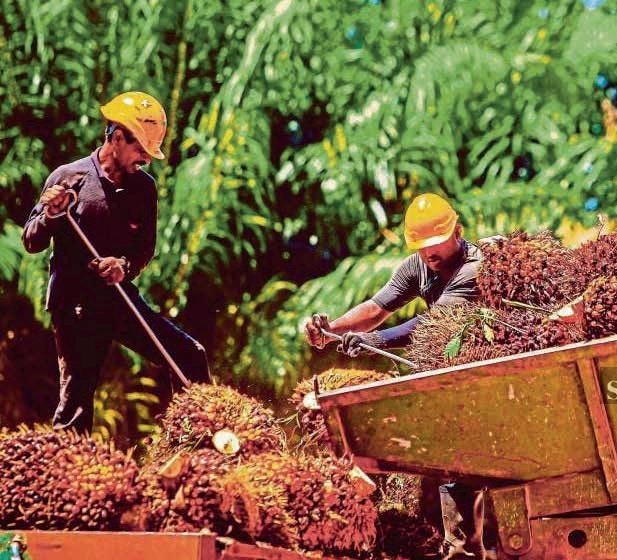
Apr-Jun 2023 | Palm Oil Today Africa Magazine 11 ORGANIZATION NEWS
Source: www.nst.com.my
Efforts to promote Malaysian palm oil-based products will continue to be enhanced by the Malaysian Palm Oil Council (MPOC). -NSTP file pic
Fitch Solutions Sees Palm Oil Prices Falling to RM2,200/Ton In 2027
Fitch Solutions Country Risk and Industry Research has held unchanged its near-term palm oil price forecasts of annual averages of RM3,800/ton through 2023, with upside risks, and RM3,400/ton through 2024.
In a report on March 1, the firm said that in the immediate term, bullish sentiment is based upon Mainland Chinese demand following its reopening, and reports that Indonesia is set to suspend some palm oil export licenses on a temporary basis, along with the depreciation of the Malaysian ringgit.
“However, we see demand uncertainties due to elevated edible oil stocks in India (and Bangladesh), as well as macroeconomic conditions in Pakistan.
“We now forecast that the global palm oil market will produce a narrow deficit in 2022/23, the first annual net negative position since 2015/16 due to an increase in the Indonesian biofuel blending mandate,” it said.

Fitch Solutions said it sees prices falling to RM2,200/ton in 2027 alongside a gradual loosening of the global production balance, on the back of a continued decline in EU palm oil demand, while noting downward pressures on production growth in Indonesia and Malaysia.
Up to Feb 20, Malaysia’s palm oil production was estimated to have fallen 6.7% month-on-month, while exports were up 30.0% over the same period in January, it said, having risen from 556,561 tons to 723,482 tons, indicating a further drawdown of inventories and a tighter global market ahead.
“Reliant on overseas migrant labor, Malaysia’s palm oil sector has faced a shortage of plantation workers since the onset of the COVID-19 pandemic, which the Malaysian government aims to have resolved by June 2023.
The firm said that on the supply side, one factor driving the price reversal has been concern pertaining to the strength of production in Malaysia, the world’s second largest palm oil producer, wherein month-ending inventories fell to a five-month low at the January close.
“In addition, Malaysian palm oil production was disrupted by inclement weather and flooding in January,” it said.
Fitch Solutions said it now forecasts that the global palm oil market will produce a narrow deficit of 100,000 tons in 2022/23, the first annual net negative position since 2015/16, on the back of an upward revision (made in 1Q2023) to its forecast for Indonesia’s domestic palm oil consumption of 2.7 million tons, caused by the February 2023 increase in the Indonesian biofuel blending mandate, from 30% to 35%, which will divert export supplies from the global market.
Nevertheless, it said a factor that will cap further palm oil price increases is the accumulation of edible oil inventories in India, the second-largest consumer and largest importer of edible oils globally.

Palm Oil Today Africa Magazine | Apr-Jun 2023 12
Source: www.theedgemarkets.com
ORGANIZATION NEWS
Genting Plantations Expects Palm Oil Prices to Be Supported by Higher Demand
Genting Plantations Bhd’s prospects for 2023 will track the performance of its plantation segment, which in turn depends on the movements in palm products prices and its fresh fruit bunches (FFB) production.
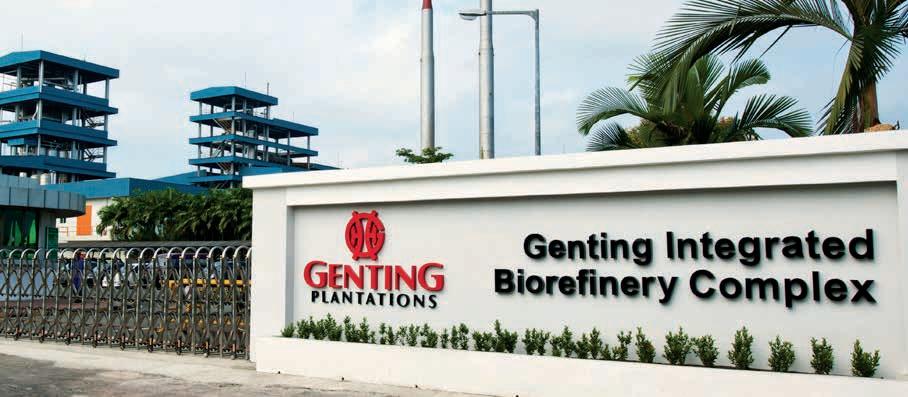
“In the short term, the group expects palm oil prices to remain supported by increased demand due to widened discount against other edible oils and increased allocation for Indonesia’s biodiesel mandate, whilst incremental supply is expected to decline in line with the slowdown of expansion of new plantings in recent years,” it said in a statement.
For 2023, Genting Plantations anticipates an improvement in FFB production, spurred by additional harvesting areas and the progression of existing mature areas into higher-yielding brackets in Indonesia, barring any weather anomalies.

Meanwhile, the production growth may be moderated by ongoing replanting activities in Malaysia.
On its property segment, the group will continue to offer products which cater to a broader market segment. It said patronage of the Premium Outlets is expected to recover to prepandemic levels.
The AgTech segment will continue to be innovative to expand the application of biological solutions, superior planting material,
automation, mechanization and digitalization solutions at the group’s estates with the goal of improving operating efficiency, enabling traceability and enhancing sustainability.
Meanwhile, the downstream manufacturing segment is anticipated to face stiffer competition from its Indonesian counterparts which enjoy competitive pricing for feedstock due to price differential arising from the imposition of export levy.
For the fourth quarter ended Dec 31, its net profit fell 65.4% to RM55.86mil, or earnings per share of 6.23 sen while revenue was lower by 26.1% to RM791.2mil.
In 2022, Genting Plantations’ net profit rose 9.1% to RM471.4mil while revenue grew 1.9% to RM3.2bil.
“The board of directors has declared a final single tier dividend of 4.0 sen per ordinary share for FY22. The board also declared a special single-tier dividend of 15.0 sen per ordinary share.
“Total dividend (including the interim dividend of 15.0 sen) for FY22 will amount to 34.0 sen per ordinary share. In comparison, the total dividend amounted to 30.0 sen for FY21,” it said.
Apr-Jun 2023 | Palm Oil Today Africa Magazine 13 ORGANIZATION NEWS
Source: www.thestar.com.my
Indonesia Hands-Over CPOPC Chair to Malaysia
“On this occasion, we officially hand over the chair of the CPOPC to the honorable Dato’ Sri Fadillah as head of the Malaysian presidency [for CPOC] for the year 2023,” Indonesia’s Coordinating Minister for Economic Affairs Airlangga Hartarto said.
Airlangga and Fadillah Yusof, Malaysia’s Commodities Minister, also agreed on the involvement of major exporting countries through policy dialogue and strategies for implementing Indonesia Sustainable Palm Oil (ISPO) and Malaysian Sustainable Palm Oil (MSPO) certifications in the global market.
“The meeting also discussed CPOPC’s membership expansion strategy, which was agreed to include Honduras as the third member of CPOPC in the near future,” said Airlangga.
Honduras will become the third country and the first Latin American nation country to join CPOPC.
Joint mission to counter discrimination against the palm oil industry
Airlangga said that Indonesia and Malaysia have also agreed to communicate and counter unwanted consequences from the European Union’s (EU) rule on deforestation against the two nations’ palm oil industry.
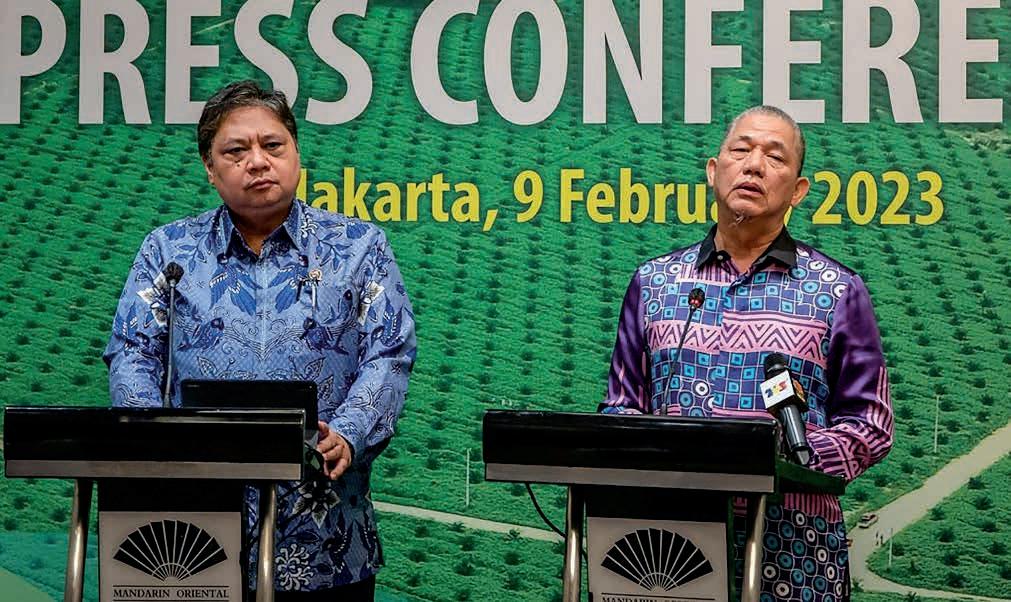
In December, the EU imposed a new law preventing coffee, palm oil, soybeans and other crops that they claim have resulted in deforestation from entering its market. Indonesia and Malaysia, as the world’s largest palm oil producers, deem the regulation as discriminatory.
Airlangga added that after the joint mission to the EU, they will make a visit to India to check out the potential for opportunities as well as promote ISPO and MSPO, which India has recognized.
Palm Oil Today Africa Magazine | Apr-Jun 2023 14
Source: en.tempo.co
ORGANIZATION NEWS
Indonesia has officially handed over the leadership of the Council of Palm Oil Producing Countries (CPOPC) to Malaysia for 2023. The hand-over ceremony took place at the Hotel Mandarin Oriental in Jakarta on February 9.
JGC, JANUS and Gas Malaysia to Conduct a Joint Study of Sustainable Palm Oil Industry Development
JGC Holdings Corporation and Japan NUS (JANUS) have signed a memorandum of understanding with Gas Malaysia Bhd for a joint study of sustainable domestic palm oil industry development through effective utilization of unused resources from palm oil milling in the country.
In a joint statement today, JGC and Gas Malaysia said the latter would provide information on facilities with good access to feedstock in Peninsular Malaysia and on bioenergy, including natural gas distribution networks.
Meanwhile, it said JGC and JANUS would study the solutions needed to convert industrial palm oil mill effluent (POME), empty fruit bunch (EFB) and thinned or waste wood to biofuel and biochemicals.
“The joint study will tie in with the Asia Zero Emission Community (AZEC) Initiative as announced by the Japan government in 2022,” they said.
The statement said the project would study the feasibility of converting the methane sources of POME and EFB into biomethane fuel and pellet fuel through recovery and processing.
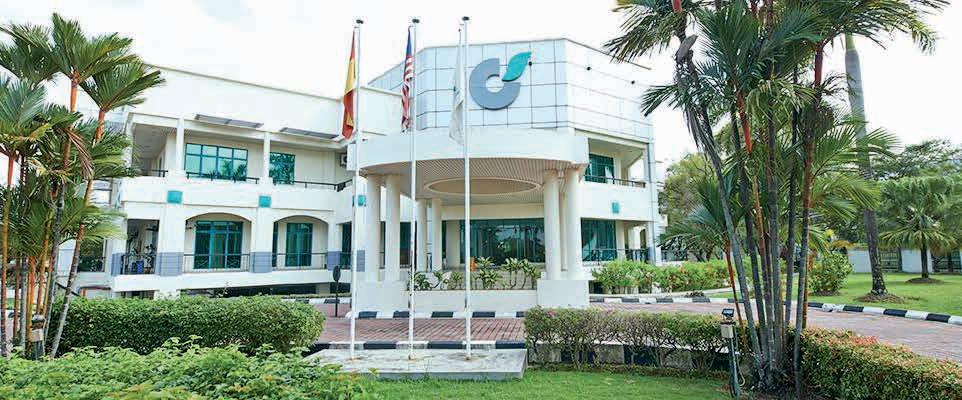
It said potential biocrude oil and biochemical applications for thinned and waste wood would also be investigated.
“The supply chain will also be studied with one facet being the optimal means of supplying fuel to small general services in Malaysia through biofuel liquefaction,” it said.
It said this research would extend to the use of carbon credits, biomethane certification and other systems that enhanced the sustainable value of any products resulting from the project.
The statement said in supporting the government agenda and aspiration to go for net-zero greenhouse gas (GHG) emissions, Gas Malaysia remained steadfast in aligning the nation’s goals with the responsibility to promote the Malaysian economy and open up new growth markets, particularly in low-carbon industries.
“The venture is part of Gas Malaysia’s strategy to grow our business adjacent to the gas value chain. With this initiative, it will enable Gas Malaysia to be a catalyst for the greater use of green gases,” it added.
Apr-Jun 2023 | Palm Oil Today Africa Magazine 15 ORGANIZATION NEWS
Source: www.thestar.com.my
Sime Darby Man Named Chairman of Palm Oil Board
The appointment of Helmy Othman Basha of Sime Darby Plantation was effective Feb 1.

The ministry of plantation and commodities has appointed Sime Darby Plantation Bhd group managing director Helmy Othman Basha as chairman of the Malaysian Palm Oil Board (MPOB) from Feb 1.

The board’s director-general, Ahmad Parveez Ghulam Kadir, said MPOB’s management is confident that Helmy’s extensive experience would help improve the sustainable development of the country’s palm oil sector.
Helmy is currently president of the Malayan Agricultural Producers Association and chairman of the Malaysian Palm Oil Association’s research and development main committee.
An accountant by training, he is also a member of the Malaysian Palm Oil Council’s board of trustees and a member of the Incorporated Society of Planters.
Palm Oil Today Africa Magazine | Apr-Jun 2023 16
Source: www.freemalaysiatoday.com
Helmy Othman Basha has been appointed chairman of the Malaysian Palm Oil Board from Feb 1. (Sime Darby pic)
ORGANIZATION NEWS
Small Farmers Petition EU For Changes to Deforestation Rule
Representatives of the country’s major small farmer organizations travelled to Brussels to personally present a petition to the European Commission demanding changes to the European Union’s Deforestation Regulation (EUDR).
The trip to Brussels follows a protest last week by several hundred oil palm and rubber small farmers from Felda, Felcra, the Rubber Industry Smallholders Development Authority (Risda), the National Association of Smallholders (NASH) and other associations over the new regulation.
Overall, the groups represent 2.5 million Malaysian small farmers and their families.
In a statement today, the Malaysian Palm Oil Council (MPOC) said the EUDR threatens small farmers’ livelihoods and future prosperity.
“Specifically, the regulation’s unilateral and unrealistic demands on traceability and geolocation will prevent small farmers from accessing the European market,” it said.
“This will jeopardize the communities’ standard of living, reduce incomes and undermine the UN Sustainable Development Goals.”
The council’s CEO, Belvinder Sron, called on the EU to provide an exemption for small farmers under the EUDR and offer a guarantee that Malaysia will not be designated as a high-risk jurisdiction for deforestation.

She said MPOC will continue to engage with the EU in Kuala Lumpur and Brussels, but its top priority is to support small farmers’ right to produce and export their palm oil.
In the MPOC statement, NASH deputy president Adzmi Hassan described the EU’s new deforestation regulation as “an attack on the way of life for our small farmers”.
“It threatens to increase poverty in rural communities across the country. The EU must consider these consequences and listen to the demands of the small farmers outlined in our petition,” he said.
Meanwhile, the assistant director of Felda’s sustainability department, Zulhilmi Azmi, called on the EU to recognize the Malaysian Sustainable Palm Oil (MSPO) supply chain certification standard as a form of compliance for the EUDR.
“The EU is supposed to encourage sustainable palm oil production, not oppress small farmers whose livelihoods depend entirely on palm oil,” he said.

The EUDR was introduced in November 2021 to limit deforestation caused by the consumption of agricultural commodities and products around the world.
It lists palm oil as one of the commodities that drive deforestation and forest degradation through the expansion of agricultural land.
The implementation of the EUDR is expected to have a significant impact on the use of palm oil in the EU, and its critics say it will create a negative image of Malaysian palm oil, which will lead to a reduction in exports to the EU and possibly globally.
Apr-Jun 2023 | Palm Oil Today Africa Magazine 17
Source: www.freemalaysiatoday.com
Members of the Malaysian delegation handing the petition to a European Commission representative in Brussels.
The Malaysian Palm Oil Council says the regulation will block access to the European market.
ORGANIZATION NEWS
All-out War Against Anti-Palm Oil Campaign
The government is working with plantation industry players to counter the negative campaign against palm oil, deputy prime minister Fadillah Yusof said.
“The unfair narrative by the EU to create a negative perception of palm oil amounts to a trade barrier,” he said.
Fadillah, who is also plantation and commodities minister, said Malaysia is joining forces with other palm oil producing countries to ensure that there is no gross misrepresentation.
“It is important for palm oil producing nations to highlight measures we have taken to dispel any misconception about palm oil,” he said in reference to the European Union Deforestationfree Regulation (EUDR).
The EUDR is a drive introduced in November 2021 to limit deforestation caused by the consumption of agricultural commodities and products around the world.
Fadillah, who was speaking at the 2023 palm and lauric oils conference and exhibition here, said Malaysian palm oil producers, on their part, should also ensure that their production process does not have a negative impact on the environment.

“It is pertinent for us to continue to support the production of sustainable palm oil under the Malaysian sustainable palm oil (MSPO) certification scheme,” he said.
The scheme grades oil palm plantations, smallholdings and processing facilities to ensure there is no biodiversity loss, land conflict, deforestation and forced labor.
The EUDR lists palm oil, as one of the commodities that drive deforestation and forest degradation through the expansion of agricultural land.
Palm Oil Today Africa Magazine | Apr-Jun 2023 18 INTERNATIONAL NEWS
Malaysia working together with other producers to counter negative narrative by the West, says Fadillah Yusof.
The implementation of the EUDR is expected to have a significant impact on the use of palm oil in the EU, and create a negative image of Malaysian palm oil, which will lead to a reduction in exports to the EU and possibly globally.
Bursa Malaysia chairman Abdul Wahid Omar, who also spoke at the event, said the palm oil industry, which is a significant contributor to economic growth, continues to face challenges on the local and global fronts.
Data from the statistics department shows that the sector recorded a 9.6% growth in the fourth quarter of 2022 (Q4 FY2022).
Crude palm oil (CPO) price breached the RM8,000 per metric ton level in March 2022 before retreating to RM3,400 in September, Wahid noted.
On Bursa Malaysia, he said, the global benchmark CPO futures contract (FCPO) achieved a record-breaking trading volume of 16.2 million contracts (equivalent to 405 million metric tons), surpassing its performance in 2021 of 390 million metric tons, accounting for more than five times the global production.
Wahid said CPO production is expected to increase by 3% to 19 million tons in 2023, up from 18.45 million tons recorded in 2022. He attributed this to the expansion of mature planted areas, particularly in Sarawak, as well as favorable weather conditions and improved labor conditions.
Putrajaya is not taking the EUDR campaign lightly and is already working with other producing countries to counter the negative narrative on palm oil, says Fadillah Yusof. (Reuters pic)

The Malaysian Palm Oil Board anticipates exports of palm oil to increase by 3.7% to 16.3 million tons in 2023, up from 15.72 million tons in 2022, thanks to continued demand from importing countries.

Apr-Jun 2023 | Palm Oil Today Africa Magazine 19
Source: www.freemalaysiatoday.com
No New Land Clearing for Palm Oil
There will be no new land clearing or deforestation for oil palm plantations, says Deputy Prime Minister Datuk Seri Fadillah Yusof.
He said the government was committed to maintaining the status quo of current land use for the purpose of oil palm plantations.
“There is no new land clearing or deforestation for the purpose of oil palm plantations.
“If there are, such lands are privately owned. And they didn’t clear the forests; instead, on their own land, they replaced old crops with new ones,” he told the reporters after the Global Business Forum 2023 here yesterday.
In December 2022, the European Union (EU) announced a decision to ban the sale of palm oil and other commodities linked to deforestation unless importers can show that the production of their specific goods has not damaged forests.
The move has prompted outcries from Malaysia and Indonesia, as the two countries are the largest exporters of palm oil.
Fadillah, who is Plantation and Commodities Minister, said that external parties must engage local players before imposing a set of standards on the plantation sector.
“Everyone wants to care for the environment and the welfare of workers, including the EU or even the United States. Malaysia is also the same.
“However, while they are trying to execute it, they might have a different set of standards from us. We have different scenarios (here in Malaysia),” he added.
Fadillah also said that the Malaysian Sustainable Palm Oil (MSPO) was on par with the Europe-based Roundtable on Sustainable Palm Oil (RSPO) scheme.

Palm Oil Today Africa Magazine | Apr-Jun 2023 20 INTERNATIONAL NEWS
“MSPO is on par with RSPO; in fact, it is even better. If they want to impose some new regulations or laws (pertaining to plantations), they need to talk to us so we can work together to ensure food security as well as take care of the welfare of the rakyat. They need to recognize our efforts,” he said.
In 2020, the United States imposed a ban on palm oil produced by Sime Darby Plantation after its Customs and Border Protection suspected of abusive labor practices.
Recently, Reuters reported that the US authorities said palm oil products made by Sime Darby Plantation were no longer produced with forced labor, hinting that the two-year import ban on the Malaysian firm would soon be lifted.

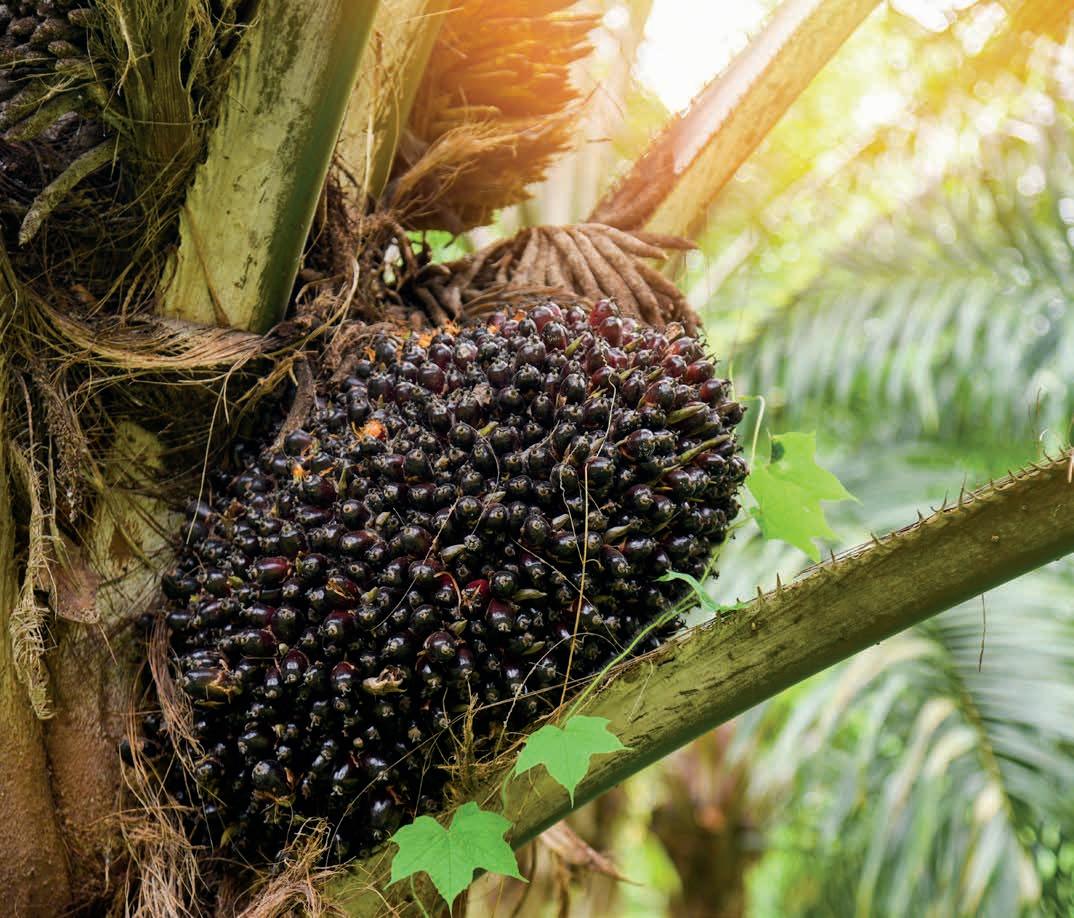
Fadillah was met after attending the forum organized by the Global Business Council and the KSI Strategic Institute for Asia Pacific.
The Global Business Forum is a high-ranking event that aims to promote Malaysian businesses globally and encourage them to better compete and succeed in the international marketplace.
Themed “Future Forward Malaysian Business”, the forum featured a number of panel discussions and presentations.
The panelists consisted of local and international policymakers, leading analysts and researchers, and some of the most innovative companies in Malaysia, who shared their experiences, insights and valuable lessons for other businesses looking to innovate and grow.
More than 400 people, including entrepreneurs, investors, government officials, members of the diplomatic corps, and business leaders from across the country, attended the forum.
Apr-Jun 2023 | Palm Oil Today Africa Magazine 21 Source: www.thestar.com.my
Palm Oil Industry Should Use HRDD As a Tool for Responsible Business Practices

Companies in the palm oil sector should adopt the concept of Human Rights Due Diligence (HRDD), which is a key tool to support business practices and enhance businesses’ positive impact.
Deputy Prime Minister and Plantation and Commodities
Minister Datuk Seri Fadillah Yusof said HRDD would ensure Malaysia was a preferred destination for migrant workers and the palm oil industry.
HRDD is defined as a risk management tool for organizations to identify, prevent, mitigate, and account for how they address actual and potential adverse human rights impacts in their operations, supply chains and business relations.
Fadillah said the palm oil industry in Malaysia had the potential to be a trendsetter for other industry transformations in the region and globally, and therefore, HRDD should not be deemed a burden.
“It should be seen as an advantage for businesses as HRDD has been embedded in the legislation of certain countries that Malaysia exports to.
“It allows Malaysian businesses to lead the industry by example, enhance their resilience and secure the exportability of their products globally, and setting in place strong systems to anticipate market disruptions in times of crisis.
“All businesses, from smallholders to multinationals, need access to practical tools to help them implement HRDD and increase their positive impact. People-positive practices will help businesses deliver positive and sustainable outcomes for their workers, businesses and investors,” he said at the launch of the People-Positive Palm (P3) First Learning Series Workshop.
Organized by the Consumer Goods Forum, Human Rights Coalition, Fair Labor Association, and International Organization on Migration (IOM), P3 is aimed at supporting companies in the palm oil sector to eliminate forced labor from their operations and supply chains.
Fadillah said the alignment of business and government efforts was important to ensure the duty to protect human rights, and encourage economic growth and business responsibility to respect, support and empower each other.
Palm Oil Today Africa Magazine | Apr-Jun 2023 22 INTERNATIONAL NEWS
Malaysia, he said, would continue to strengthen its efforts to support people through positive approaches such as policies and action plans with institutional partners such as the International Labor Organization and the United Nations Development Program.
“These initiatives will help to ensure that the palm oil industry in Malaysia can set an example for other industries’ transformations.
“Malaysia can lead the way in the region and globally, encouraging other countries to follow in the path towards people-positive industries and demonstrating how HRDD can be effectively implemented on the ground.
“I hope the palm oil sector, through a pragmatic business approach to HRDD, will address root causes of forced labor in a sustainable and structural manner.

The government, he added, was already taking steps to further this goal, which included the implementation of the National Action Plan (NAP) on Forced Labor and the planned launch of the NAP on Business and Human Rights.

“There is still much to do towards solving all the issues that we face, but charting the right course right from the outset is extremely important,” he said.
Rethink Palm Oil Export Sanctions

The European Union (EU) should do justice to economies by allowing them to function after necessary measures have been taken to ensure that their oil palm plantations are sustainable, says the Prime Minister.
Datuk Seri Anwar Ibrahim said Asean, including Malaysia, had encountered difficulties with the EU pertaining to palm oil exports due to the sanctions imposed.
He said as the world’s second largest palm oil producer, Malaysia was deeply concerned over the implementation of the EU deforestation-free products regulation and he had raised those concerns during discussions with visiting German President Frank-Walter Steinmeier.
“We have taken all necessary measures and carried out reforestation, including in peat soil areas. They (the EU) should do justice to this region.
“They should allow us to function economically and not be so rigid,” said the Prime Minister at a joint press conference with Steinmeier.
Anwar said he had shared with Steinmeier Malaysia’s initiatives, including the mandatory implementation of the Malaysian Sustainable Palm Oil certification to the palm oil industry.
He added that Malaysia was just as committed to finding climate change solutions as other countries.
“It is not for one region to impose; we think it is unjust and impairs the progress and development of our country.
“Malaysia is of the view that any attempt to protect the environment should not be at the expense of our economy,” he added.
The EU recently introduced new deforestation regulations on the import of selected commodities including palm oil, of which it claimed to be linked to deforestation and forest degradation.
The Prime Minister said he had also informed Steinmeier of PETRONAS’ interest to export liquefied natural gas to Germany.
Palm Oil Today Africa Magazine | Apr-Jun 2023 24
INTERNATIONAL NEWS
“Another issue which we discussed was the alarming trend of Islamophobia and growing fascism in some parts of Europe and the West.
“This trend undermines global peace, harmony and security.
“Malaysia stands ready to work with Germany to combat intolerance, negative stereotyping, stigmatization, discrimination and incitement of violence,” he said.

To a question, Anwar said Malaysia regarded China as an important trading partner and would continue to have good relations with the country.
“For Malaysia and Asean, we take the position of peace and neutrality,” he added.
Steinmeier noted that there were 700 German companies operating in Malaysia which had created 65,000 jobs, adding that this cooperation should be further extended to draw more benefits.
He said although Germany’s investments and the presence of its companies in Malaysia were significant, he believed more could be done.
“What convinced me was the aspect of vocational training. I spoke to young people here and they said there is a need to intensify vocational training in Malaysia,” he added.

He said Germany and Malaysia should intensify relations, adding that aside from sharing commonalities and both having established democracies, the nations shared a commitment to free and fair trade, as well as to combat climate change.
Steinmeier, who is in Malaysia for a three-day official visit, heads to Sarawak today.
The last state visit to Malaysia by a German president was 26 years ago in April 1997.
Germany is Malaysia’s largest trading partner from the EU. Last year, Malaysia’s total trade with Germany increased by 10.9% to RM59.87bil (US$13.62bil) compared to RM53.99bil (US$13.03bil) in 2021.
Apr-Jun 2023 | Palm Oil Today Africa Magazine 25
Source: www.thestar.com.my
Deputy Prime Minister and Plantation and Commodities Minister Datuk Seri Fadillah Yusof said HRDD would ensure Malaysia was a preferred destination for migrant workers and the palm oil industry. - NSTP/MOHAMAD SHAHRIL BADRI SAALI
Sabah Remains Significant Regional Palm Oil Producer Despite Decline in Yields

Sabah continues to be a significant regional palm oil producer, providing livelihood and shared prosperity for all Sabahans, said the Malaysian Palm Oil Association (MPOA).
Its chief executive officer Joseph Tek said last year, Sabah produced 23.3 per cent of Malaysia’s crude palm oil (CPO), generating 4.29 million tons from its landbank of 1.51 million hectares of planted oil palm area.

“However, there was a decline in crop yield, oil and kernel extraction rates (OER and KER), by 2.4 per cent, 1.5 per cent, and 0.9 per cent respectively, year-on-year.
“Despite these challenges, MPOA expressed gratitude to the Sabah government for its continued support and cooperation with the oil palm industry,” he said at the MPOA Sabah branch’s annual general meeting (AGM) here today.
Tek said the global palm oil industry is expected to face tighter CPO availability this year due to several factors, including only a potential marginal increase in CPO output from top producing countries Malaysia and Indonesia by less than three per cent, respectively.
“Heavy rainfall and floods in parts of Malaysia are expected to impact CPO production due to short-term disruptions to estate harvesting operation, logistics, and poorer fruit-set.
“The last three years of La Nina have caused significant damage to oil palm root systems, leading to smaller fruit bunches, lesser oil content, and uneven fruit sets.”
Tek added that the rising number of over-aged and very tall oil palm trees in Malaysia is also expected to continue to constrain supply as replanting has been slow due to high costs.
“On a positive note, authorities have facilitated the return of more foreign workers, easing labor woes among many planters. Normalcy is expected among many planters by the middle of this year.”
Palm Oil Today Africa Magazine | Apr-Jun 2023 26 INTERNATIONAL NEWS
Source: www.nst.com.my
The global palm oil industry is expected to face tighter CPO availability this year. - NSTP file pic









Indonesia Pledges Policy Transparency with New Palm Oil Exchange

Indonesia’s plan to channel crude palm oil (CPO) exports via a futures exchange would improve policymaking in the top producer and avoid a need for the type of export ban that sent shockwaves through global markets last year, its chief regulator said.

Authorities aim to require all CPO exports to go through a futures exchange starting from June in order to create Indonesia’s own benchmark price, similar to benchmarks in exchanges in Kuala Lumpur and Rotterdam. Currently, nearly all CPO shipments from Indonesia are directly conducted with buyers.
The plan came after Indonesia shocked global markets last year with what appeared at times to be haphazard policy-making, culminating in a three-week export ban, as officials tried to alleviate a local shortage of cooking oil.
“The main goal of having an exchange is transparency and good governance. When it is transparent, the government can utilize the data for policy-making,” Didid Noordiatmoko, head of commodity futures regulator Bappebti said in an interview.
“The president’s decision last year (to ban exports) hurt the whole palm oil industry. We do not want that to ever happen again,” Didid said.
Indonesia banned CPO and its derivative exports between April and May 2022 to bring down cooking oil prices. The ban was later replaced by rules to only allow exports after a company had sold a portion of its CPO locally to be made into cheap cooking oil — known as a domestic market obligation (DMO).
Palm Oil Today Africa Magazine | Apr-Jun 2023 28
Trucks are seen near a palm oil plantation at a village located near Indonesia’s projected new capital, known as Nusantara National Capital, in Sepaku, East Kalimantan province March 8, 2023. (Reuters pic)
INTERNATIONAL NEWS
The policies distorted the market and resulted in a glut of domestic supply, prompting authorities to make another U-turn and remove export levies to clear stocks.
Didid said once the exchange was launched and data collected, the government would be in a better position to assess DMO rules or even scrap them.
Industry groups have said they supported Indonesia’s aspiration to become a global price setter for palm oil, but were concerned about additional costs.
Didid said based on other commodities exported via a futures exchange, such as tin, exporters could increase margins and cover any additional costs.
Bappebti was working to ensure CPO transactions via a futures exchange could be exempted from value added tax, which has also been a concern for exporters, he said.
Transactions will be quoted in the rupiah currency, Didid said.
With work still underway, Didid said meeting a June deadline to launch the market was challenging, and Bappebti may come up with a revised timeline at the end of March.
Sathia Varqa, co-founder of Palm Oil Analytics, called the plan “ambitious”, pointing out that the market needed access to timely data and liquidity for the exchange to work.
“Indonesia struggles with releasing palm oil data in a transparent, timely and credible way,” he said, contrasting the quality and frequency of data released by the Malaysian Palm oil Board and the US Department of Agriculture.

Apr-Jun 2023 | Palm Oil Today Africa Magazine 29
Over 80 Oil Palm Farmers, Others Benefit from RSPO Capacity Building in Edo
As part of plans to boost oil palm production in Nigeria, the Roundtable on Sustainable Palm Oil (RSPO) has flagged off a capacity building programme for four oil palm producing communities in the Ovia South-West Local Government Area in Edo State. The Foremost Development Services Limited, Intermediary Organization (IMO) for the RSPO flagged off the capacity building.
Fatai Afolabi, the Managing Consultant and Chief Executive Officer of Foremost Development Services Limited said the Community Outreach and Engagement Programme (COEP) was to engage stakeholders at all levels of society within palm oil producing countries in Asia, Africa and Latin America.
Afolabi said that over 80 smallholder oil palm farmers, elders, youths, women and community-based organisations (CBO) were trained on the principles and criteria of RSPO.
He added that the programme, which was to ensure an equitable playing field for all stakeholders in the palm oil industry, focuses on the three impact goals of Prosperity, People and Planet.
He said the participants were drawn from Madagbayo, Gbelebu, Udo and Maroghionba (AT&P) communities in the Ovia SouthWest local government area.
“With this training RSPO wishes to educate the communities and other stakeholders in the palm oil supply chain on the standards to adopt for sustainable palm oil production.
“It also wishes to raise the level of awareness of the people on the obligations of the communities and companies producing sustainable palm oil on matters relating to their rights, livelihoods, social and environmental management, protection of communities and employees.
“In all of these, the overall aim of RSPO is to make sustainable palm oil the norm”, he said.
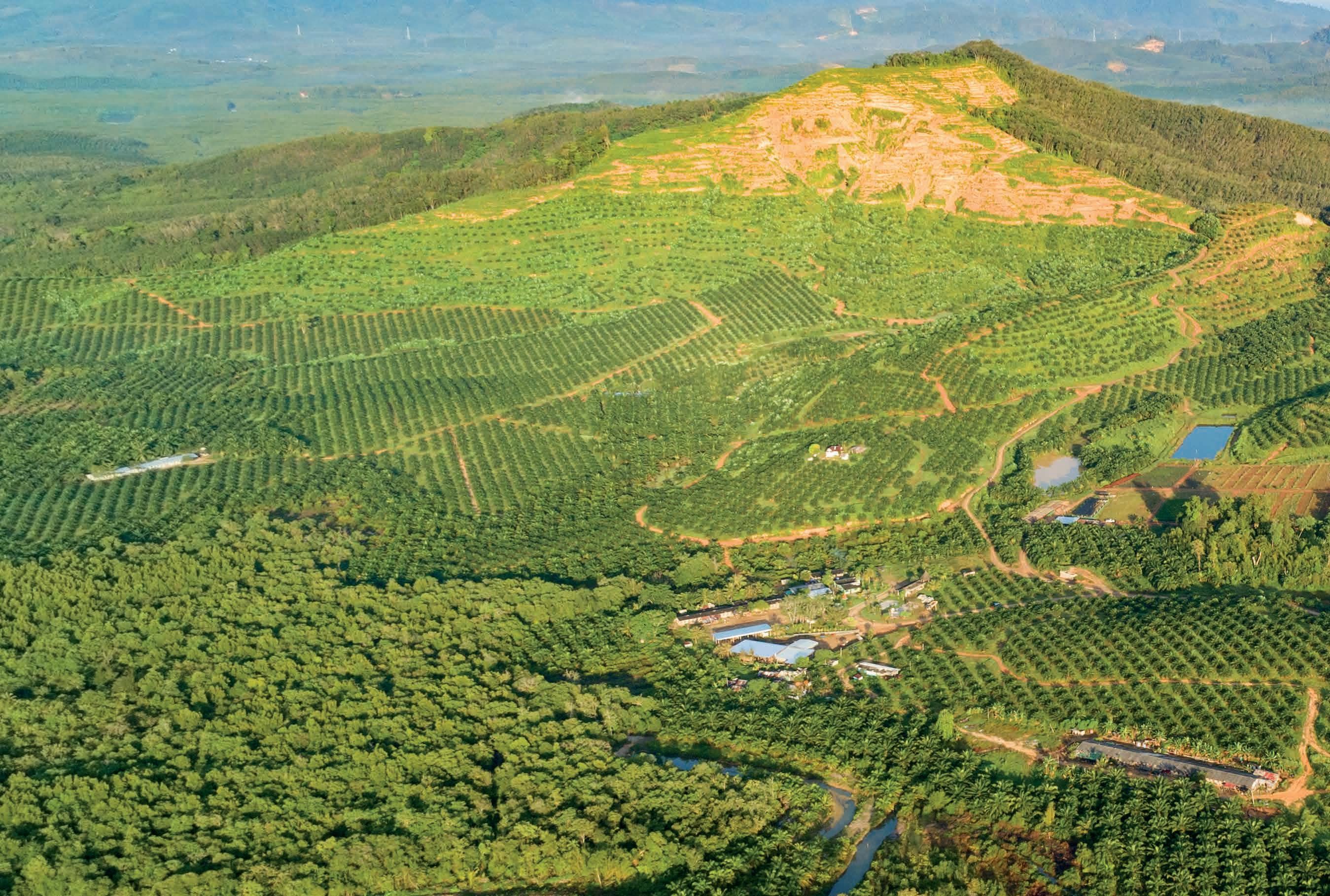
He explained that the choice of Edo State for the COEP was as a result of its being the major producers of sustainable palm oil in Nigeria.
He added that the Edo State Government has also subscribed to the production of sustainable palm oil through the application of the RSPO standards.
He said the state government has also mandated investors through the Edo State Oil Palm Programme (ESOPP) to do the same in order to achieve a palm oil sector that is sustainable.
Palm Oil Today Africa Magazine | Apr-Jun 2023 30
INTERNATIONAL NEWS
He further said the capacity building on the RSPO Community Outreach and Engagement Programme will run for 14 months and will involve stakeholders.
Fatai pointed out that the stakeholders include local communities, civil society organizations, smallholder farmers, government agencies, media and oil palm companies.

He also added that the Community Outreach and Engagement Programme will be organized in six oil palm producing local government areas in the state.
He listed the six local government areas to include Ikpoba Okha, Ovia South-West, Ovia North-East, Ovia South-West, Uhunmwonde, Owan West and Orhionmwon.
He stated that between 90 and 120 farmers and other stakeholders will benefit from the capacity building in each of the local government areas.
He said RSPO is a global multi-stakeholder initiative on sustainable palm oil and not-for-profit international membership organization that unites stakeholders from key sectors of the palm oil industry.

Source: nigerianobservernews.com
It should be recalled that the Roundtable on Sustainable Palm Oil (RSPO) had on October 25, 2022 during the official launch of the Community Outreach and Engagement Programme in Edo State said it committed the sum of $300,000 into the promotion of sustainable palm oil production in Edo State.
Apr-Jun 2023 | Palm Oil Today Africa Magazine 31
Some participants at the RSPO Community Outreach and Engagement Programme for oil palm farmers and others at Ovia South-West in Edo State. Pix by Idris Umar Momoh
Quanzhou Deputy Mayor Calls for Malaysian Palm Oil Producers, Traders to Expand to The City
A delegation from the city of Quanzhou, Fujian, in China, has called on Malaysian palm oil producers and traders to expand business contacts with the city.
In a statement, the Malaysian Palm Oil Board (MPOB) said the entourage, including representatives from nine Chinese main food producers in Fujian province, led by Quanzhou deputy mayor Wang Zhihong, visited the headquarters of the Malaysian Palm Oil Board (MPOB) and met with its director-general, Datuk Ahmad Parveez Ghulam Kadir, in his office here today.
“The meeting was also attended by Malaysian and Chinese industry members interested in food manufacturing and palm oil trade,” it said.
“Our innovations and formulations will support the burgeoning and ever-expanding growth of the Chinese snack food industry that demands higher quality palm oil,” he said.
The Chamber of Commerce for Fujian Food Manufacturers and Erapoly Global Sdn Bhd also exchanged a letter of intent for the palm oil trade, witnessed by Ahmad Parveez and Wang.
Based on the data from Chinese Customs, Fujian province imported 530,000 tons of palm oil in 2021.

Quanzhou is one of the largest production centers for snack food, confectioneries and bakeries, and it is also the main destination for palm oil exports in China.
MPOB said the delegation also aimed to procure palm oil for the peak food production season in the third quarter of this year.
Ahmad Parveez said MPOB had developed new palm oil formulations for food applications, especially innovations using red palm oil, structured palm fats and palm tocotrienols as ingredients for snack food.

Palm Oil Today Africa Magazine | Apr-Jun 2023 32
A delegation from the city of Quanzhou, Fujian, in China, has called on Malaysian palm oil producers and traders to expand business contacts with the city. - NSTP/LUQMAN HAKIM ZUBIR
INTERNATIONAL NEWS
Myanmar’s Domestic Edible Palm Oil Price Rising

The edible palm oil reference price set by the Edible Oil Import Storage and Distribution Supervision Committee rose by over 100 kyats from 4,470 kyat per viss (approx. 1.5 Kg) to 4,600 kyat.
With the rise of the official reference price the retail price in the domestic market also rose to prices varying between 7,000 and 8,000 kyat elsewhere in the country.
In Yangon retail market, the edible palm oil price was 6,000 kyat per viss in late February and then it rose up to over 7,000 kyat per viss now.
The Edible Oil Import Storage and Distribution Supervision Committee constituted by the Military Council usually sets the reference price based on the global price for trading in the domestic market but the actual price being traded in the open market is always nearly twice this reference price.
Similarly other edible oils such as groundnut oil, sesame oil, sunflower oil, vegetable oil, and soya bean oil are also rising in the domestic market along with the price of edible palm oil. The local products sesame oil is being traded at 13,500 kyat per viss and groundnut oil is being traded at 13,000 kyat per viss in the local retail market.
The annual demand of edible oil in Myanmar is about 1.1 million tons of which 900,000 tons is being imported from the foreign countries. The Military Council said they are aiming for self-sufficiency of edible oil in the country, with the plan to produce a surplus to export to foreign countries.
Apr-Jun 2023 | Palm Oil Today Africa Magazine 33 INTERNATIONAL NEWS
Source: www.mizzima.com
Palm Oil Industry Face 3-5 Years Production Halt Due to Replanting Curbs
Palm oil expansion looks less promising in the long run as stricter regulations are slowing down growth of new oil palm cultivation thus, lowering yield of fresh fruit bunches (FFB) and pushing up costs.
Kenanga Research in a recent note cautioned that palm oil production could be put on hold for three to five years for the industry to replenish older palms with younger saplings.
“Longer term, the growth for palm oil looks less rosy. Expansion in the form of new oil palm planting is slowing due to tighter regulations,” the research house said.


It noted that Indonesia, which has 15 million ha area of oil palm trees has only three to four million ha left for the crop, while Malaysian oil palm area has been contracting even before reaching a voluntary cap of 6.5 million ha.
“This implies fewer young and prime palms over the coming years while palms planted in the 1990s and 2000s are growing older and taller, slowing down harvest, lowering FFB yield and pushing up costs…Replanting will eventually be necessary leading to a production pause for three to five years,” it said.
This will result in lower FFB yield and higher cost
Palm Oil Today Africa Magazine | Apr-Jun 2023 34
PLANTER’S CORNER
Edible Oil
On another note, the research house believes that the recovery of edible oil supply in 2023 is underway but could be less robust than is expected.

“Fragile supply recovery for 2023 may now extend into 2024 on a subdued inventory outlook following smaller-than-expected soyabean surplus in South America,” it stated.
Kenanga Research said although a record outlook for a Brazilian soyabean harvest is likely but so is for a very poor Argentinean harvest.
It noted that while Brazil is the top producer of edible oil, Argentina is actually more important for international trade, often ranking as the third or fourth largest edible oil exporter in the world after Indonesia, Malaysia and at times, Russia.
Thankfully, it thinks that the supply of palm oil should also increase, which is good news for the market for edible oils.
“Fortunately, palm oil supply should recover in 2023 with crude palm oil (CPO) prices likely to stay relatively firm over 2023 and into 2024 unless palm, soy or rapeseed harvests prove exceptionally good later in 2023,” it said.
Kenanga Research said it is keeping its 2023 CPO price forecast at RM3,800 per metric ton (MT) intact but is revising up its 2024 CPO price forecast from RM3,500 to RM3,800 per MT. It believes that a higher palm oil production of 3%-5% in 2023 should ease oil supply, even if on a limited scale.
“Nevertheless, easing labor shortfall in Malaysia should help nudge FFB up by one to two million MT year-on-year,” it said.
However, it said even as supply recovers, demand is also expected to recover, potentially at a faster pace due several factors namely, palm oil being an essential food and fuel for markets in emerging economies such as China, India and Indonesia; palm oil being more affordable than many other alternatives and increasing demand for biofuel.
Kenanga Research said Asia Pacific is the world’s biggest market for edible oil with China, the world’s No 1 market, is already consuming almost as much as the European Union (EU) and the US combined while India should surpass the US soon with Indonesia close behind.
It added that demand from the region is also expected to get higher on demographic growth and rising affluence.
“Among the most widely used edible oil in the region is palm oil,” it said.
Kenanga Research pointed out that before palm oil overtook soybean oil to become the leading edible oil by volume around the turn of this century, it used to enjoy premium prices.
Currently, it said palm oil commands around 35% of the market share and half of all edible oil traded internationally since it is often more affordable than many other alternatives.
Apr-Jun 2023 | Palm Oil Today Africa Magazine 35
Biofuel
On biofuel, the research house said much like the EU, Indonesia’s biofuel policy aims to improve energy security and preserve the environment but also to support the rural economy.
Today, it noted that the US and Indonesia are near equal as the second and third biggest biofuel users after the EU.
Biofuels such as bioethanol are derived from sugar/starch-rich crops (sugarcane or corn) while biodiesel is from edible oils.
“The main palm-based biodiesel market is Indonesia which just raised its B30 blend to B35 in February this year. Brazil also recently raised its soy-based biodiesel B10 blend to B12 last week with B15 as the target by 2026,” it said.

Valuation
Valuation-wise, Kenanaga Research said the plantation sector is currently trading close to book value which, it said, is often understated as many players hold estates which are worth more than their reported value.
“Gearing is not excessive either with some holding net cash. Although costs have risen resulting in tighter margins, they are still decent overall and palm oil is also an essential consumable (as food and fuel), popular with emerging economies,” said the research house.

However, it pointed out that there is no strong upside catalyst even though the sector is highly defensive and ratings are far from demanding.
“Sector consolidation is a possible upside but best evaluated on a case-by-case basis,” it said.
Kenanga Research maintains its ‘Neutral’ call on the plantation sector with Kuala Lumpur Kepong Bhd as its sector pick given its track record, efficient upstream operations and strong regional presence. It also has an ‘Outperform’ call on PPB Group Bhd, TSH Resources Bhd and Hap Seng Plantations Holdings Bhd.
Palm Oil Today Africa Magazine | Apr-Jun 2023 36
Source: themalaysianreserve.com PLANTER’S CORNER


Conserving Wildlife Through Sustainable Palm Oil
THE Malaysian Palm Oil Board (MPOB) always ensures that palm oil production does not affect the environment and wildlife in the country.
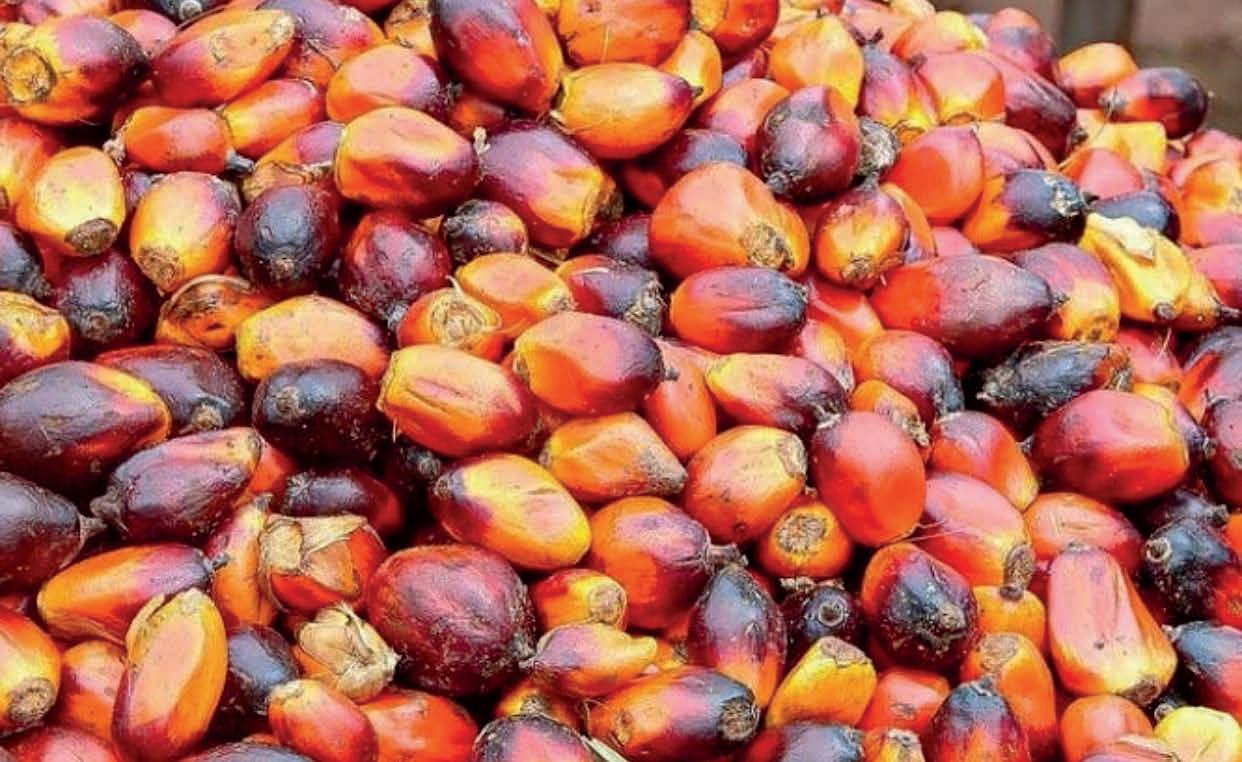
Supporting the concept of ‘living together in harmony’ between wildlife and oil palm, we make sure that the Malaysian palm oil production complies with the country’s current laws and regulations in an effort to achieve the Sustainable Development Goals.
The country’s policy and legal framework ensures sustainable development balances environmental protection and socioeconomic development through the implementation of various programs and initiatives for the conservation and protection of forests and biodiversity.
Among the programs are the national forestry initiative namely, the Central Forest Spine and Heart of Borneo, reforestation through the replanting of forest tree species, the establishment of wildlife corridors and the reduction of GHG emissions.
Malaysia together with Indonesia and Brunei are active in the “Heart of Borneo” Initiative to conserve about 20 million hectares of ecologically interconnected rainforest, with about 30 per cent of the area in Malaysia.
The initiation of Borneo Elephant Wildlife Sanctuary addresses human-elephant conflict and creates a controlled public access sanctuary to better understand and care for these animals.

The initiation of Borneo Elephant Wildlife Sanctuary addresses human-elephant conflict and creates a controlled public access sanctuary to better understand and care for these animals. STR/ MOHD RASHIDI YUSUF.
We have revised the Malaysian Sustainable Palm Oil (MSPO) standards last year where improvements were made on matters involving social and labor, good practices, high conservation values, social impact assessment, and quantification of greenhouse gas (GHG) emissions.
Retaining high conservation values, high carbon stock areas and riparian buffers, which are part of the requirements of certification schemes such as MSPO, provide opportunities for plantation companies to actively contribute towards wildlife conservation.
The planting of elephant grass species encourages the elephants to utilize the wildlife corridors and help to mitigate humanelephant conflict in Sabah and ultimately allow coexistence between wildlife and plantations.
Palm Oil Today Africa Magazine | Apr-Jun 2023 38 GREEN SOLUTIONS
Malaysia has long made concerted efforts to ensure the conservation of its biodiversity and natural resources by creating and supporting projects both inland and at sea such as the Sepilok Orangutan Rehabilitation Centre, Turtle Island Reserve, Sipadan Island Reserve, and Danum Valley. Sepilok, renowned for its orangutan rehabilitation project has expanded its objectives to include public education on conservation and research on other endangered species.
The establishment of the Malaysian Palm Oil Green Conservation Foundation (MPOGCF) reflects the country’s commitment in conserving the environment as it is a proactive initiative that sees the Malaysian palm oil industry working together with organizations such as the Sabah Wildlife Department to support wildlife rescue and conservation efforts.

MPOGCF’s initiatives include surveys on the latest population of Bornean orang utans and pygmy elephants in Sabah and to identify conservation challenges and opportunities for these wildlife species.
Fragmentation of forests is one of the factors that contribute to the declining population of elephants in the country. The limited area also makes it difficult for elephants to move and find food. Hence, elephants tend to collide with humans and further increase human-elephant conflict, posing threats to the safety of the surrounding communities.
Human-elephant conflict is a major conservation concern in the country. It is also a threat to the safety of the communities and affects the yield of agricultural crops, particularly, oil palm.
According to reports, more than 9,600 cases of human-elephant conflict were recorded in Peninsular Malaysia between 2006 and 2020 with the highest number of attacks totaling 1,108 cases in 2009.
The years between 2010 and 2016 saw a downward trend in the number of elephant attacks with the lowest number of 327 cases registered in 2016.
However, the number of conflicts went up again in the last few years with 341 cases recorded in 2017, 496 cases in 2019 and 549 cases registered in 2020.
Based on several reports, from 2015 to 2020, human-elephant conflicts led to an estimated RM30 million in losses, mainly brought about by damage to crops including oil palm. The year 2019 accounted for almost 50 per cent of the losses at RM14 million.
Apr-Jun 2023 | Palm Oil Today Africa Magazine 39
There were cases of wild elephants affecting the yield of oil palm plantations in Johor and the encounters between the oil palm planters and the communities in the state contribute to the declining number of elephants.
MPOB, in collaboration with Earthworm Foundation, a non-profit organization have conducted a series of field visits, interviews and preliminary surveys to understand the challenges faced by the oil palm smallholders with regard to humanelephant encounters in Johor.
We conducted a survey in Sungai Ara, Kota Tinggi in Johor which is the focus area of the human-elephant encounters and decided to carry out the ‘Human-Elephant Coexistence Program’, making the area as the pilot location for the project.
This project, funded by the MPOGCF, will support wildlife conservation, improve community safety and reduce crop damage while ensuring the consistency of palm oil supply in the market.

This capacity building project will mitigate the human-elephant conflict which is a concern to the oil palm growers in Sungai Ara.
Smallholders and nearby plantations will competently manage human-elephant encounters through the use of early warning systems and periodic patrols. This integrated management will help improve community safety and reduce damage to crops.
We hope to strengthen data collection to assess the impact of human-elephant coexistence strategies through this project.
This project will inspire other communities to take steps to support human-elephant coexistence efforts and provide longterm sustainable solutions to this complex problem involving the oil palm smallholders, in particular.
The writer is the director-general of Malaysian Palm Oil Board, Datuk Dr. Ahmad Parveez Ghulam Kadir
The above comments and opinions in the article are the author’s own and do not necessarily represent Palm Oil Today Africa‘s view.
Palm Oil Today Africa Magazine | Apr-Jun 2023 40
Source: www.nst.com.my GREEN SOLUTIONS












Sustainability and Its Role in Greenhouse Gas (GHG) Emissions
By: Dr Rosediana Suharto
Executive Director, Responsible Palm Oil Initiative (RPOI)

Bogor, Indonesia - According to the report of the World Commission on Environment and Development chaired by Gro Harlem Brundtland entitled “Our Common Future” (United Nation, 1987). It highlighted that humanity can carry out sustainable development (sustainability). This sustainable development is necessary, to ensure the current generation could meet the needs of future generations. The concept of sustainable development is limited by the current technologies, and social organizations are dependent on natural resources and the ability of the ecosystem to mitigate the effects of human activities.
But technologies and social organizations can be scaled up to open opportunities for a new era of economic growth. The World Commission on Environment and Development (WCED), stated that widespread of poverty is inevitable. Sustainable development requires meeting the basic needs of everyone and maximizing every opportunity towards building a better life. A world where poverty is endemic will always be vulnerable against ecological disasters.
Sustainability has become the purpose of businesses, non-profit organizations and government organizations in the last decade, but measuring how far an organization can apply sustainability to reach a rapid sustainable growth, is thought to require a considerable amount of effort.
John Elkington attempted to measure events during mid-1994s by incorporating a new framework to measure performance in American corporates. (Slaper 2011)
Long before Elkington introduces the concept of sustainability as a ““triple bottom line” (TBL) or also known as 3P’s (People, Planet dan Profit), environmentalists were grappling with the size and framework for sustainability.
The academic disciplines have conducted studies and pilot practices of sustainability have more than doubled since the last 30 years. Academics and non-academicians who have
conducted studies and practices sustainability, agreed with the definition by Andrew Savitz (2006) for the Triple Bottom Line (TBL). TBL captures the essence of sustainability by measuring the effects from organization activities in the world, includes its profitability and shareholder value, as well as its social, human, and environmental capital. The trick isn’t in defining TBL. The trick is to measure it.
This accounting, is called the triple bottom line (TBL), which goes beyond traditional measures of profit, return on investment, and shareholder value to include environmental and social dimension. Focused on comprehensive investment—that is, performance and the interconnected dimension of profit, people and planet which are interconnected, the reporting of triple bottom line could become an important tool in supporting sustainability purpose.
Responding to this statement, at the end of 1990s, the term 3P’s (People, Planet and Profit) or “triple bottom line (TBL)” was introduced by J. Elkington which emphasized on Brundtland’s report. Based on studies’ result and survey conducted by worldwide expert, there is a relationship between 3P’s and corporate social responsibility (CSR) as well as Sustainable Development.
Palm Oil Today Africa Magazine | Apr-Jun 2023 42
SPECIAL INSIGHT
Application of 3P’s
Marc J. Epstein (2008) conducted an experiment on the application of 3P’s in a number of large companies in the United States and Europe, and the result, companies has shown better performance in three sectors, which is environment, social and economic. Companies gave protection for their employees as how it should be and did other things which are measurable.
Epstein in his book “Making Sustainability Work “(2008) said that “sustainability has been defined as economic development that meets the needs of the present generation without compromising the ability of future generation to meet their own need. For business this include the issues of corporate social responsibility and citizenship along with improve management corporate social and environment impacts and improve stakeholder engagement.”
Epstein explained that sustainability is in great demand and has gotten important attention because:
1. Government regulation and codes of conduct that require companies to give attention and increase their activities for sustainability. Failure to comply with regulations (still to this day) results in company having to pay dearly, includes:
• Penalties and fines
• Legal cost
• Loss of productivity and additional inspections
• Potential closure of operations
• The related effects on corporate reputations

2. Public Relations
Public and NGO activists are increasingly aware of sustainability, the potential and impact that companies have on society and environment. Identifying social and environmental issues by companies is important for stakeholders and potentially enhancing stakeholders’ relationship can foster loyalty and trust. Gaining license to operates from the government, community and other stakeholders is very important for companies to be able to conduct business sustainably. Good companies’ performance and sustainability can increase a positive reputation for stakeholders and improve relationship with communities. This can improve companies’ performance and productivity.
3. Expenses and Income
Sustainability can create value for company through increased revenue and lower costs. In other words, implementing sustainability is a good business decision. Revenue can be increased through sales due to increased company reputation, especially where public awareness towards company’s environmental and social effect is higher. Identifying areas where what is being done is good for community, environment and company is the key.
4. Social and moral obligations
If company brings negative effect on environment and community, then company is responsible for implementing sustainability. Personal concern for social and moral obligation has made several corporate executive and senior management implement sustainability as one of their strategies. Corporate leader recognizes the tight relationship between business and community, and redefines economic, environmental and social responsibility around the concept of sustainability. A large number of corporate leaders has adopted sustainability for each of the reasons listed above

Apr-Jun 2023 | Palm Oil Today Africa Magazine 43
In Marc J. Epstein’s book (2008), there are more than 95 companies that implement sustainability principles and reduce environmental impact, for example, Addidas Solomon, British American Tobacco, Cadburry – Schweppes, Coca Cola, Colgate, Unilever, Hennes & Mauritz, Dow Chemical, Dupont, etc.
The conclusion is that sustainability related to environment and greenhouse gases, social and economic is very important for company and community. However, lately environmental issue had a huge impact because it felt like the effect of climate change has increase and causing economic difficulties. Many countries have given special attention to this issue. Country needed to achieve net zero emission to reach commitments to the Paris Agreement. It states that the global average temperature rise must be “well below 2°C above pre-industrial levels and make effort to limit temperature increase to 1,5°C”.
Understanding and implementation of sustainability at several countries and organizations
In fact, numerous parties interpret sustainability differently. European Union (EU) stated that sustainability with much more consideration on land use change (the type of land planted on its land coverage) and greenhouse gas (GHG) emission saving. As for biofuels, EU did not take into account social and economic criteria in its implementation of sustainability. For the calculation of GHG emission from the Direct Land Use change (DLUC), emission is also calculated from Indirect Land Use Change (ILUC). If emission from ILUC is higher than DLUC’s emission, therefore emission from DLUC is ignored. For biofuels or biodiesel from food and feed stock, the usage for transport in Europe is reduced to only 7% in 2023 and phase out of palm oil methyl ester (PME) will end in 2030.
In one of the explanations, EU stated that they could also limit the use of biofuel from palm oil by using instruments that have been implemented, for example subsidies and anti-dumping duty.

In order for palm oil to be used in the manufacturing of biofuels / PME, it must be certified as sustainability low ILUC risk whereas the criteria are difficult to accomplish. This is in accordance to the regulation contained in Commission Regulation on rules to verify sustainability and greenhouse gas emissions saving criteria and low indirect land-use change-risk 146 (2022) C (2022)3740.
Implementation of sustainability in United States (US)
On November 2021, United States government published The Long-Term Strategy of the United States: Pathways to Net-Zero Greenhouse Gas Emissions by 2050 by United States Department of State and the United States Executive Office of the President, Washington DC. Signed by John Kerry, Special Presidential Envoy for Climate and Gina Mc Carthy, National Climate Advisor. On December 2021, the US President inaugurate the implementation of The Federal Sustainability Plan.
Based on President Biden’s Executive Order to catalyze industry and clean energy through Federal Sustainability Plan and The Long-Term Strategies (together it was referred to as “The Federal Sustainability Plan “) sets out various ambitious goals to reach emission reduction. This is consistent with President Biden’s goal of reducing glasshouse gases emission in US by 50-52 percent from 2005 levels by 2030 and limiting global warming to 1,5 degrees Celsius, as science demands. Through Federal Sustainability Plan, Federal Government is going to achieve the following:
Details of each program within the Federal Sustainability Plan is as follow:
On December 2021, President Biden signed an Executive Order directing the Federal Government to use its procurement scale and power to reach these three ambitious goals:
• One hundred percent carbon pollution-free electricity (CFE) by 2030, where half is supplied by local clean energy to reach 24/7 demands
• Acquire one hundred percent zero-emission vehicle (ZEV) by 2035, this includes 100 percent acquisition of net-zero lightduty vehicle by 2027;
• Net-zero emission through Federal purchase;
This executive action is a part of the President’s broader commitment to increase investment in clean technology industry, as well as accelerating America towards achieving a carbon-free electricity sector by 2035.
Palm Oil Today Africa Magazine | Apr-Jun 2023 44
SPECIAL INSIGHT
United States policy prioritizes net zero emission in all industry, with the purpose of reducing global temperature changes. This executive action is thought to be able to protect natural damage, and workers. Due to climate change, it is estimated by the people of US will lose their job because of extreme weather, new widespread of diseases, natural destruction and loss of biodiversity, etc. For the continuity of industry and life, emission in all sectors must be reduced by the United States’ Nationally Determined Contribution (NDC), is 50-52% from 2005 levels by 2030.
Like the European Union, United States also imposes tough administration for the palm oil biodiesel imported from Indonesia and provisions related to emission level as well as ILUC emission and other provisions. Indonesia has faced at least 2 times anti-dumping duty from the US, as was done by the European Union. This is because, according to them, Indonesia has caused a high number of land change especially from the forest and that has caused high emission.


This ambitious level has become the basis for European Union’s Intended NDC that targeted lower glasshouse gases emission aby 40% of 1990 levels by 2030.
Roundtable on Sustainable Palm Oil (RSPO)
Since 2000s the world of palm oil has been shocked by various issues raised by NGOs, especially the implementation of sustainability. This is an example of environmental damage due to oil palm cultivation as well as GHG emission because of land change, labor welfare, forced labor, child labor, gender equality, etc. At the beginning of this new millennium, not many people understand what sustainability meant.
In 2001, WWF began exploring the possibility of creating a roundtable for sustainable palm oil. The result was an informal partnership between Aarhus United UK Ltd, Golden Hope Plantations Berhad, Migros, Malaysian Palm Oil Association, Sainsbury’s and Unilever together with WWF in 2002.
In response to global push for sustainable palm oil management, Roundtable on Sustainable Palm Oil (RSPO) was formed in 2004 with the purpose of promoting the growth and usage of palm oil products through credible global standard and involvement of stakeholders. Its founders are the same as those in collaboration with WWF, which are Aarhus United UK Ltd., Karlshamns AB (Swedia), Malaysian Palm Oil Association (MPOA), Migros Genossenschafts Bund (Switzerland), Unilever NV (Netherlands), and Worldwide Fund for Nature (WWF). The following organizations have also been an active member within RSPO Executive Board since its inception, Golden Hope Plantations Berhad (Malaysia), Loders Croklaan (Netherlands), Pacic Rim Palm Oil Ltd (Singapore), and The Body Shop (UK). Head Quarter of this organization is located in Zurich, Swiss, meanwhile the secretariat is located in Kuala Lumpur with a Representative Office in Jakarta. RSPO is registered in Swiss as NGO.

Apr-Jun 2023 | Palm Oil Today Africa Magazine 45
RSPO is the first organization that set up a sustainability system for a palm oil plantation which aims to produce sustainable CPO because the fruit it produced is intended to be used as industrial raw material. This is done with the purpose of producing end products with other treatments such as biofuels, butter, toiletries, etc.

In response to global push for sustainable palm oil management, Roundtable on Sustainable Palm Oil (RSPO) was formed in 2004 with the purpose of promoting the growth and usage of palm oil products through credible global standard and involvement of stakeholders.
Sustainability within RSPO is an implementation of a sustainable system for palm oil plantation through implementation of Good Agricultural Practices and also detecting Glasshouse Gasses (GHG) emission and reducing activities that increase GHG. To reduce greenhouse gasses emission, land that has high carbon stock such as forest, peatlands and old shrubs is forbidden for plantation. RSPO also requires its member not to plant in area that have High Conservation Value (HCV), where six different HCV must be applied, different from land with high carbon stock. HCV contains other things, such as biodiversity, ecosystem and habitats, ecosystem services, communities’ needs and culture. It can be concluded that fruits produced through plantation that implement RSPO’s P&C are sustainable fruits and will produce sustainable CPO.
In its application in the global market, a standardized product can be traded at the request of buyer through ship order with cost insurance and freight (CIF), and of course not free on board
(FOB) where palm oil is sold on the ship and can be bought by buyer in different countries. This is to ensure the traceability of the palm oil.
There are 2 modules on the supply chain requirements for mills mechanism, which are:
1. Identity Preserved
A palm oil mill / factory is considered to implement Identity Preserved (IP) if FFB processed by the mill comes from a certified plantation. RSPO’s Principles and Criteria (RSPO P&C), or contrary to the Group Certification Scheme.

Certification for CPO mill is needed to verified volume and source of FFB that went into the mill, the implementation of any processing controls (for example, if physical segregation is used) and the volume of sales of RSPO certified product.
2. Mass Balance
A mill or factory is considered to produce palm oil as Mass Balance (MB) if that mill processed FFB from a RSPO certified plantation and uncertified plantation. Mill may source FFB from uncertified farmers, besides from certified supplier or third party. In this scenario, mill can only claim the palm oil product’s volume produced from processing certified FFB as MB.
Palm Oil Today Africa Magazine | Apr-Jun 2023 46
SPECIAL INSIGHT
RSPO still tolerates uncertified products to provide opportunities for uncertified farmers due to inability to fulfill principles and criteria. Likewise with the Mass Balance provisions in the article 35 from Renewable Energy Directive on the promotion of the use of energy from renewable sources (recast) (EU Directive 2019/2001), but in EU RED, mass balance is not the difference due to uncertified raw material, but because of the difference in energy content. For audit, EU also sets a different rule.
In accordance with the previous discussion, it can be concluded that EU, US, RSPO has implemented sustainability, if examined at a glance, all are based on 3P’s principles. EU prioritizes saving emission with the purpose of reducing effect from climate change. However, arguments have been made in various forums including between countries, that EU conducted assessment on a less scientific basis, by including indirect land use change, as emission from indirect land use change (ILUC).
Implementation of Sustainability in Indonesia
Implementation of sustainability in Indonesia started by implementing sustainability system in palm oil plantation to produce sustainable fruit, and then processed to become sustainable oil and in this case, it become Crude Palm Oil (CPO). A sustainable CPO is a tradable product, meanwhile FFB is traded only locally. For it to be traded in an international market, the product or CPO must fulfill WTO Annex 1 Technical Barrier to Trade (TBT) requirements.
Sustainable system is known as Principles and Criteria, Indonesian Sustainable Palm Oil (ISPO), which was initially in its preparation influenced heavily by RSPO’s Principles and Criteria, and so is their trading model. Even so, at the beginning, ISPO principles and criteria still implement ISO series guide in its certification system, audit and accreditation.


In order for this system to be credible, every aspect within it must fulfill international standard for example certification and audit as well as accreditation; and all these provisions can be found in the ISO documents. Because Indonesia which in this case National Standardization Agency (NSA) is a member of International Organization for Standardization (ISO) and ISO has 167 member nations, it is expected that every standard that fulfill ISO, should be adopted by its member nations.
Therefore, it is very important that there is harmony between ongoing ISPO standard with ISO, so that ISPO is not only a certification tool in the country but also accepted globally.
In Indonesia, the requirement to become an auditor should also follow SNI ISO 19011 regarding Management System Audit Guidelines and generally auditors have also been trained for ISO 19011, if implementing other provisions then it will be difficult to find auditor capable of conducting the audit. Auditor must also be equipped with ISO 14001 & ISO 9001 to increase the competency in understanding environmental management and system management.
At this time, various reports allegedly indicated that many auditors had not been able to demonstrate SNI ISO 19011 at the time of ISPO audit. It is important for all auditor to understand and be aligned with international standard, so that they can compete in international market. Every auditor should also be equipped with ISO 14001 and other ISO standards to implement environmental standard and 3P’s standard in other sustainability (for example social) in carrying out their duty as sustainability certification auditor.
Apr-Jun 2023 | Palm Oil Today Africa Magazine 47
Principles and Criteria complied in the first phase (ISPO 2015) are intended after field test will be submitted to the National Standardization Agency (NSA) to be processed into Indonesian National Standardization (INS) so that CPO can be traded in accordance to Law Number 20 of 2014 regarding Standardization and Conformity Assessment as well as Law Number 34 of 2018 regarding Standardization System and National Conformity Assessment. Aforementioned approach will also facilitate partnership with other foreign Standardization Agency with the provisions of Mutual Recognition Arrangement (MRA).
The thoughts were conveyed because the standard and provision applied to any commodities are not only for the purpose of meeting demands of market and buyer. Besides the standard, there are also measure similar to them, for example Principles and Criteria. As it is known, standard is a trading instrument. Therefore, in the inception and implementation of standard for Indonesia should be sensitive to market demand, but must not be a burden for Indonesian commodities.
Net Zero Emission
Related to the President’s commitment at Glasgow during UNFCCC Meeting in 2022 that Indonesia will also implement clean industry and net zero emission by 2030 and the highest achievement is expected in 2050.
Palm oil industry is always accused by foreign stakeholder in various publications, as the biggest emission contributor, meanwhile emission from electricity supply, transport, industry, building and household are not mentioned.


To overcome this, scientific research should be done, and involve not only scientist and expert in the country, but also from foreign country. It is advisable to research emission from palm oil plantation industry, from production process to finished goods and the planning or target to reach net zero emission. We should remember that compared to other commodities, palm oil industry is the first industry that implement sustainability. The long-term plan to reduce emission is published by Ministry of Environment and Forestry entitled INDONESIA LongTerm Strategy for Low Carbon and Climate Resilience 2050 (Indonesia LTS-LCCR 2050), whereas the estimated production and emission from palm oil plantation are also outlined within it.
Indonesia should have a plan of net zero emission for all activities that produced emission, not just plantations and deforestation, but also include other activities such as electricity, industry, transportation, building, household, etc.
Palm Oil Today Africa Magazine | Apr-Jun 2023 48
SPECIAL INSIGHT C M Y CM MY CY CMY K













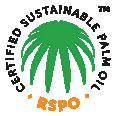


Asia Palm Oil Magazine JuzTalk Thailand Fireworks Media (Thailand) Co., Ltd. Part of The Fireworks Trade Media Group ENDORSED BY : Thai Oil Palm & Palm Oil Association Muar Ban Lee Group HOSTED BY : SILVER SPONSOR : CONFERENCE BY : OFFICIAL MEDIA : ORGANIZED BY : Thai Palm Oil Refinery Association Thai Palm Oil Crushing Mill Association Asia Palm Oil Technology Association Thai Biodiesel Producer Association Ministry of Energy Department of Agricultural Department of Agricultural Extension (DOAE) Roundtable on Sustainable Palm Oil (RSPO) The Agricultural Research Development Agency (Public Organization) - ARDA Deutsche Gesellschaft für Internationale Zusammenarbeit (GIZ) GmbH Oil Palm and Palm Oil Research and Innovation Institute (OPPORI) Contact us : Tel: (+66) 2 513 1418 | Email: info@fireworksthai.com THAILAND’S LARGEST PALM OIL TECHNOLOGY EVENT! THAILAND’S LARGEST PALM OIL TECHNOLOGY EVENT! 17-18 AUGUST 2023 CO-OP EXHIBITION CENTRE, SURATTHANI, THAILAND www.palmoil-conference.com www.thaipalmoil.com Palmex Thailand
An Interview with Inke Van Der Sluijs, Market Transformation Direction, Roundtable on

Sustainable Palm Oil (RSPO) Sustainability and Palm Oil’s Future

 Inke van der Sluijs Director, Market Transformation
Inke van der Sluijs Director, Market Transformation
RSPO’s Director of Market Transformation, Dr. Inke van der Sluijs, a Ph.D. holder in biology, joined the RSPO in November 2013. Inke’s role in the RSPO secretariat is to lead the global market transformation by working with regional teams to ensure that the supply and demand of certified sustainable palm oil continue to grow. The supply of certified sustainable palm oil should be met by a demand for positive impact on the ground. The focus of this work is on mature markets like Europe and North America but also big consumption markets like Indonesia, India, and China. For Africa and Latin America, as new frontiers, the focus is on sustainable production and creating local market demand. Inke works with the Shared Responsibility Unit and Working Group on ensuring that the downstream members develop sustainable sourcing, environmental, and social policies. In addition to that, she also supports the Market Development Standing Committee.
We have seen rapid growth in its early years to increase the supply of certified sustainable palm oil. It looks like we’re plateauing a little bit now. We’re around 20% of the global palm oil that is produced and certified, which means it’s deforestationfree, and it ensures that human rights are respected. We need to increase the market demand in large consumption areas. The sustainable palm oil market for Europe and North America is very mature but for Indonesia itself, although the largest producer and consumer of palm oil, there’s limited demand for sustainable palm oil. Same in Malaysia, India, and China. We need to find ways to promote sustainable sourcing in these countries. Of course, we hope to grow in this these markets, to ensure that the farmers that have changed our practices are incentivized for the change that they are making. We’ve also increased the supply of certified sustainable palm oil.
Palm Oil Today Africa Magazine | Apr-Jun 2023 50
1. Can you brief me a little bit on the palm oil outlook on sustainability and supply chain concerns?
COVER STORY
2. What are your views on the EU’s tough stance towards palm oil? How can RSPO/MPOA play a role in alleviating the situation?
It’s an interesting question because I’ve been based in the European market and I’m in a global position now. Before I was responsible for growing the European market, there was a lot of demand for sustainable palm oil as it’s a mature market. There’s also this active campaign against palm oil which makes our work super difficult because consumers are confused by the messages that companies used, say this product does not contain palm oil, for example. We need to educate the consumers and the companies that there’s good palm oil when it’s produced sustainably. Now the EU has adopted this legislation to halt deforestation, on imported goods for specific commodities and palm oil is one of them. We agree with the European Union that we should limit deforestation and we already founded it in 2004. For that, we agree with that direction because it creates a level playing field for our members in the region. At the same time, it should be done at a reasonable pace with requirements that the sector can meet. Saying it needs to be legal and deforestation-free is a direction that we fully support, but it also needs to be implementable. We see issues, for example, smallholders. Of course, we don’t want this legislation to come into force too quickly, because then companies cannot work with the smallholders and ensure that they can still be included in the imports into Europe. It’s really important however the detailed text of the commission is not out yet. If the European Commission decides on this direction, we’re glad because we fully support the move on halting deforestation. However, the way it should be implemented by the sector is something that they should be looking at for voluntary schemes. In other commodities, there are voluntary schemes. They should look at ways that it’s feasible for companies to implement it and ensure that they can meet the timelines that are now laid out.
3. Given Indonesia and Malaysia’s agreement towards the EU’s renewable-energy directive, what are the steps the palm oil industry has taken to address this issue?

The EU directive on biofuels works towards phasing out firstgeneration feedstocks. Direct use of palm oil for biofuels will no longer be allowed, starting in 2030. This is the same for sunflower rapeseed and all virgin oils, the feedstocks will not be used for biofuels, because of the EU’s opinion that there should be other ways to make the transport sector more sustainable. Think about hydro, hydrogen, solar power, and other means of using cooking oils, so it’s not the virgin oils that should go into biofuels. I think the sector will be impacted because the consumption of palm oil in Europe will decrease, say until 2030. I think the sector has ensured that they can import pumps for biofuels. However, it will no longer be possible to do that after 2023.

Apr-Jun 2023 | Palm Oil Today Africa Magazine 51
4. EU officials say their regulations do not target any one country and are aimed at ensuring that commodity production does not further drive deforestation. What’s your take on this?


That’s correct. What they say is none of the imported goods should contribute to deforestation. Malaysia and Indonesia, of course, feel offended by the fact that the commission has listed seven commodities that have been related to deforestation in the past. However, the regulation will be applied to all commodities and imported goods. Hence, part of the sector is ready to do this as our members have not deforested since 2005 which during our standards came into effect. These companies are ready to comply and import into Europe. The challenge is that palm oil is a commodity categorized as liquid. Oftentimes, we mix sustainable material with conventional uncertified material. This will be a challenge for companies to prove that the conventional material that they have in the mix is not related to deforestation. That will be the challenge.
5. Do share with us other challenges that the palm oil industry currently overcome and what are future projects and plans.
There are a lot of challenges. There will be less harvesting and fruits going to waste. The eyes are on RSPO. When we were founded, we were very much focused on the environmental impact of the agricultural sector. These days, there’s more attention on human rights. A large challenge ahead for our members is ensuring that the workers are treated fairly, working in safe conditions, getting appropriate salary, and housing. The focus will now be on the social effects. So that’s the other thing about the regulation. RSPO is now a holistic scheme where you look at environmental and social impacts, and improve these
conditions. The regulation that is out now or accepted now is not fully published and is focused on deforestation and legality. The new legislation will come on human rights and the risk is that companies will fall for the inputs if Europe only looks at deforestation and its legality. Once the human rights element comes in, they look only at human rights. Whereas if they use our skills to prove that they have done their due diligence on environmental and social elements, you have it all covered. The EU is very focused on what the director general is responsible for. It’s either environmental or social. Whereas RSPO has already evolved into a scheme that covers all of the elements of sustainability. That includes labor conditions and workers’ rights. I think that will be a challenge in the coming years.
We’re currently revising our standards. By the end of the year, our new standard should be endorsed. It is about creating a standard that can be applied by our members, that is clear and auditable. The evidence for positive impacts on the ground can be proven, I think that is an important development. We hope that our members all agree and adopt our new standard by the end of the year.
Palm Oil Today Africa Magazine | Apr-Jun 2023 52
COVER STORY


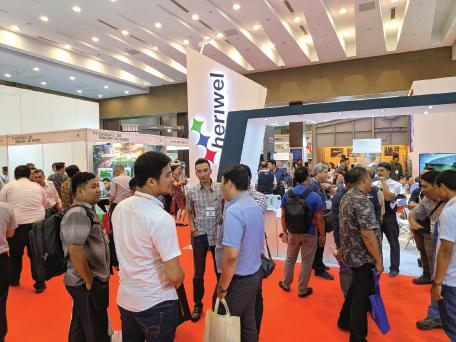




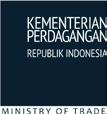

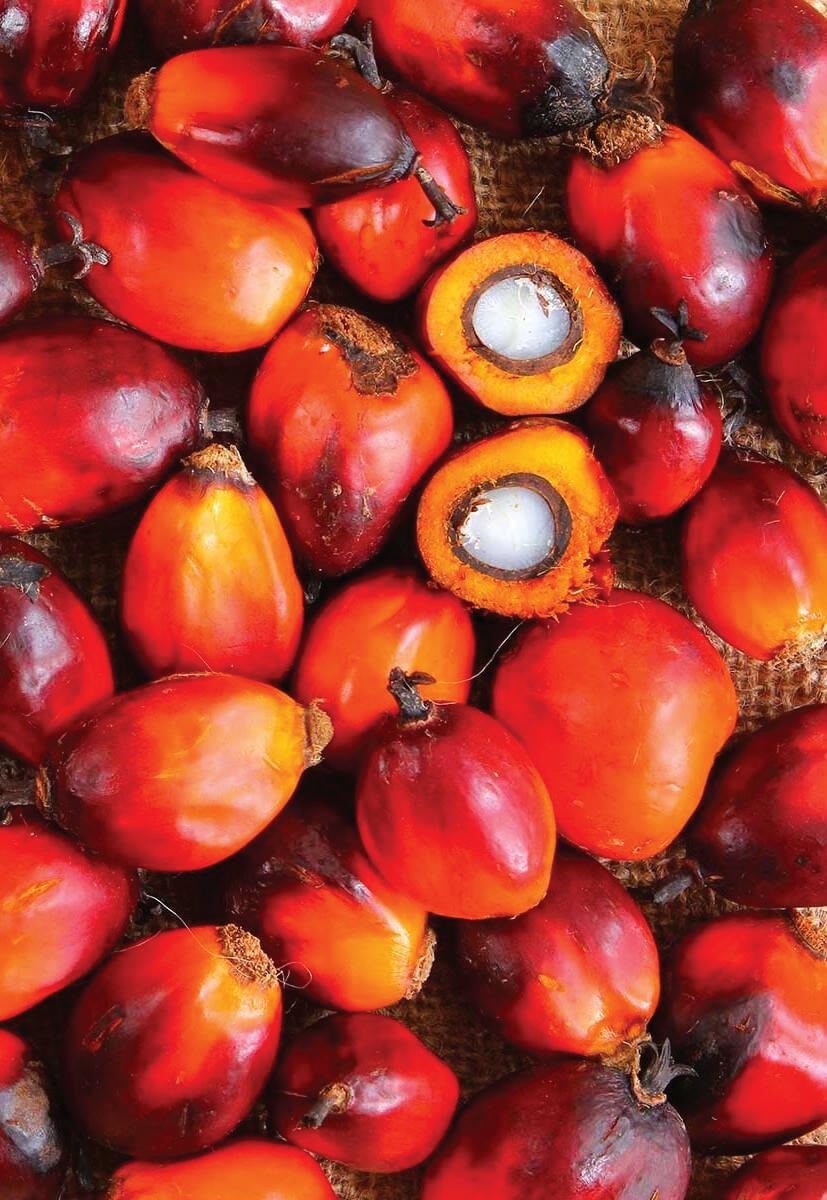






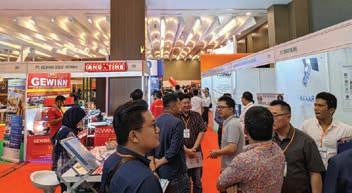


OCTOBER 2023 4-6 SANTIKA PREMIERE DYANDRA HOTEL & CONVENTION MEDAN - INDONESIA THE13TH EDITION OF 2023 Brought To You By : Endorsed and Suppor ted By : INDUSTRY NETWORKING LUNCH Technology Seminars International Conference JOIN THE WORLD’S LARGEST PALM OIL EVENT highlights of the event www.palmoilexpo.com 9 th INDONESIA INTERNATIONAL PALM OIL CONFERENCE 2023 Incorporating : +62 21 5088 2917 info@fireworksid.com
Top 10 African Countries Producing Palm Oil
• Palm oil is a versatile and widely-used ingredient in many products we use daily, due to its high melting point and relatively low cost.

• The production of palm oil has resulted in devastating environmental damage and human rights abuses, despite providing income to rural communities in poorer nations.
• Indonesia is the largest producer of palm oil, followed by Malaysia and Thailand, with several other African and South American countries also producing significant amounts.
Palm oil has become an essential ingredient in various products we use daily, from food to cosmetics and even biofuels. It is a versatile and inexpensive vegetable oil, and demand for it has skyrocketed in the past few decades. However, palm oil production has also been linked to environmental damage and human rights abuses. Despite these concerns, palm oil production remains an important industry providing jobs and contributing to economic growth in many countries, including several in Africa.
Palm Oil Today Africa Magazine | Apr-Jun 2023 54 DID YOU KNOW
Top 10 African Countries Producing Palm Oil
Here are the top 10 African countries producing palm oil, according to data from the World Agricultural Production
Top 10 African countries producing Palm Oil (Amount of Palm Oil produced in African countries in 2022/2023)
1. Nigeria: With a production of 1.4 million metric tons, Nigeria is the fifth-largest producer of palm oil in the world and the top producer in Africa. The country has a long history of palm oil production and is well-suited for its cultivation due to its tropical climate.
2. Cote d’Ivoire: Also known as Ivory Coast, this West African nation produced 600,000 metric tons of palm oil in the latest estimates. Palm oil is one of the country’s main agricultural products, and the government is investing in expanding the industry.
3. Cameroon: Cameroon is another West African country that has been producing palm oil for decades. It is the 12th-largest producer in the world, with an output of 465,000 metric tons.
4. Ghana: Ghana’s palm oil industry is still relatively small, with a production of 300,000 metric tons. However, the government has identified it as a priority sector for development, and investments are being made to expand the industry.
5. Congo (Kinshasa): Also known as the Democratic Republic of Congo, this country produced 300,000 metric tons of palm oil in the latest estimates. The industry has faced challenges due to political instability and a lack of infrastructure.
6. Sierra Leone: Sierra Leone produced 75,000 metric tons of palm oil in the latest estimates. The industry has been growing in recent years, and the government is promoting it as a way to diversify the country’s economy.
7. Angola: Angola produced 55,000 metric tons of palm oil in the latest estimates. The industry has faced challenges due to a lack of investment and infrastructure, but the government is working to promote it as a priority sector.

8. Guinea: Guinea produced 50,000 metric tons of palm oil in the latest estimates. The industry has potential for growth, and the government is working to promote it as a way to create jobs and increase exports.

9. Liberia: Liberia produced 45,000 metric tons of palm oil in the latest estimates. The industry has been growing in recent years, and the government is investing in expanding it.
10. Senegal: Senegal produced 14,000 metric tons of palm oil in the latest estimates. The industry is still in its early stages, but the government is promoting it as a way to reduce the country’s dependence on food imports.
Apr-Jun 2023 | Palm Oil Today Africa Magazine 55 Source: africa.businessinsider.com
Joint Statement on The Bilateral Ministerial Meeting Between CMEA And MPC

for exporters of palm oil and reduce their competitiveness against other vegetable oils in the European Union. The Ministers noted their disappointment to the European Union that has not conducted consultations with its trading partners in a meaningful way.


1. The Deputy Prime Minister, Minister of Plantation and Commodities of Malaysia and the current chairman of Council of Palm Oil producing Countries (CPOPC), YAB Dato’ Sri Haji Fadillah bin Haji Yusof, and the Coordinating Minister for Economic Affairs of the Republic of Indonesia, H.E. Airlangga Hartarto representing the CPOPC Ministerial Council held a Bilateral Ministerial Meeting followed by the Palm Oil Industry Dialogue on 9 February 2023 at the Mandarin Oriental Hotel in Jakarta, Indonesia.
2. In the meeting, the Ministers discussed some of the pressing issues with regard to the palm oil industry, and proposed a joint approach and possible coordinated actions. Both Ministers agreed to continue protecting the palm oil sector by strengthening efforts and cooperation in addressing discrimination against palm oil. In particular, Ministers discussed the European Union’s Deforestation-free Commodities regulation. Both Ministers expressed grave concern on the adoption of the regulation, which will have significant negative impacts on global palm oil exports as well as other developing countries. The Ministers agreed that the Regulation is a protectionist instrument that will raise costs
3. In relation to that, strategies for a wider recognition of ISPO and MSPO in the global market were discussed and to be actively pursued, including the benchmarks and pathways for the recognition. The meeting also discussed strategies on the expansion of CPOPC membership and saw the possibility of Honduras becoming the third member of CPOPC very soon. In further enhancing the visibility of CPOPC, the meeting agreed to intensify engagement with the United Nations bodies. The Ministers also concurred for more coordinated efforts between the two governments to resolve the issue of labor shortages and legalization of foreign workers in the industry.
Palm Oil Today Africa Magazine | Apr-Jun 2023 56
EVENT HIGHLIGHTS
4. In response to the recent political agreement on the proposal of the European Union Deforestation-free Commodities, the meeting agreed to conduct a joint mission to the EU in communicating the unintended consequences of the regulation to the palm oil sector, especially on possible exclusion of smallholders from the supply chain, and in seeking possible collaborative approach among parties concerned. CPOPC intends to continue engaging with the EU in seeking favorable outcomes for both producing and consuming countries. The meeting agreed on the feasibility of using ASEAN as a strategic platform to voice the concerns of palm oil sector.
5. The Ministers also agreed that following the joint mission to the EU, a visit will also be made to India to harness some of the potential opportunities in the country. The visit among others, aims at promoting further the use of palm oil following the recognition of ISPO and MSPO by India through a joint initiative with the Indian Palm Oil Sustainability Framework (IPOS), and the introduction and acceptance of CPOPC’s Global Framework of Principles for Sustainable Palm Oil (GFP-SPO).

6. Following the bilateral meeting, both ministers participated in the working lunch and industry dialogue that was attended by the representatives of key stakeholders of the oil palm sector of both Indonesia and Malaysia. During the dialogue session, H.E. Airlangga Hartarto officially handed over the chairmanship of CPOPC to YAB Dato’ Sri Fadillah bin Hj Yusof as Malaysia will be the Chairman for 2023.
7. The takeaway of the Industrial Dialogue was that everyone including the Government, Private Sectors and smallholders need to be united in addressing the prevailing common issues plaguing the industry for the good of the palm oil producing countries.

Apr-Jun 2023 | Palm Oil Today Africa Magazine 57



Palm Oil Today Africa Magazine | Apr-Jun 2023 58 To Advertise Or To Subscribe, Please Contact Us: International Enquiries: Africa Enquiries Advertisers Index Advertisers ABS Innovations Sdn Bhd MAPEX 2023 Muar Ban Lee Engineering Sdn Bhd Nantong Ant Machinery Co. Ltd Palm Oil Today Africa PALMEX Indonesia 2023 PALMEX Malaysia 2024 PALMEX Thailand 2023 PMT Industries Sdn Bhd Rio Tinto Services INC YKL Engineering Sdn Bhd Page OBC 27 Cover Botom 5 IBC 53 41 49 PFIFC 37 IFC
absi.global
Website
www.palmoilfair.com www.mbl.com www.antcn.cn www.africapalmoil.com www.palmoilexpo.com www.asiapalmoil.com www.thaipalmoil.com www.pmt-grp.com www.agriculture.borax.com www.yklgroup.com.my +62 812 7562 8281 info@zenithexhibitions.com africa@asiafireworks.com www.africapalmoil.com




A Joint Publication by Fireworks Business Information (Singapore) & Zenith Media (Nigeria) African Countries Covered: Nigeria, Ivodry Coast, Conga, Kenya, Ghana, Cameroon
VOICE OF AFRICA'S
INDUSTRY WWW.AFRICAPALMOIL.COM
QUARTERLY PUBLICATIONS REACH OUT TO QUALIFIED LE ADERS & KEY DECISION MAKERS AFRICA CIRCULATIONS www.africapalmoil.com my@asiafbi.com +603-6151 9178 +6012-639 4271 Jointly Published by :
THE
PALM OIL
PALM OIL TODAYAFRICA




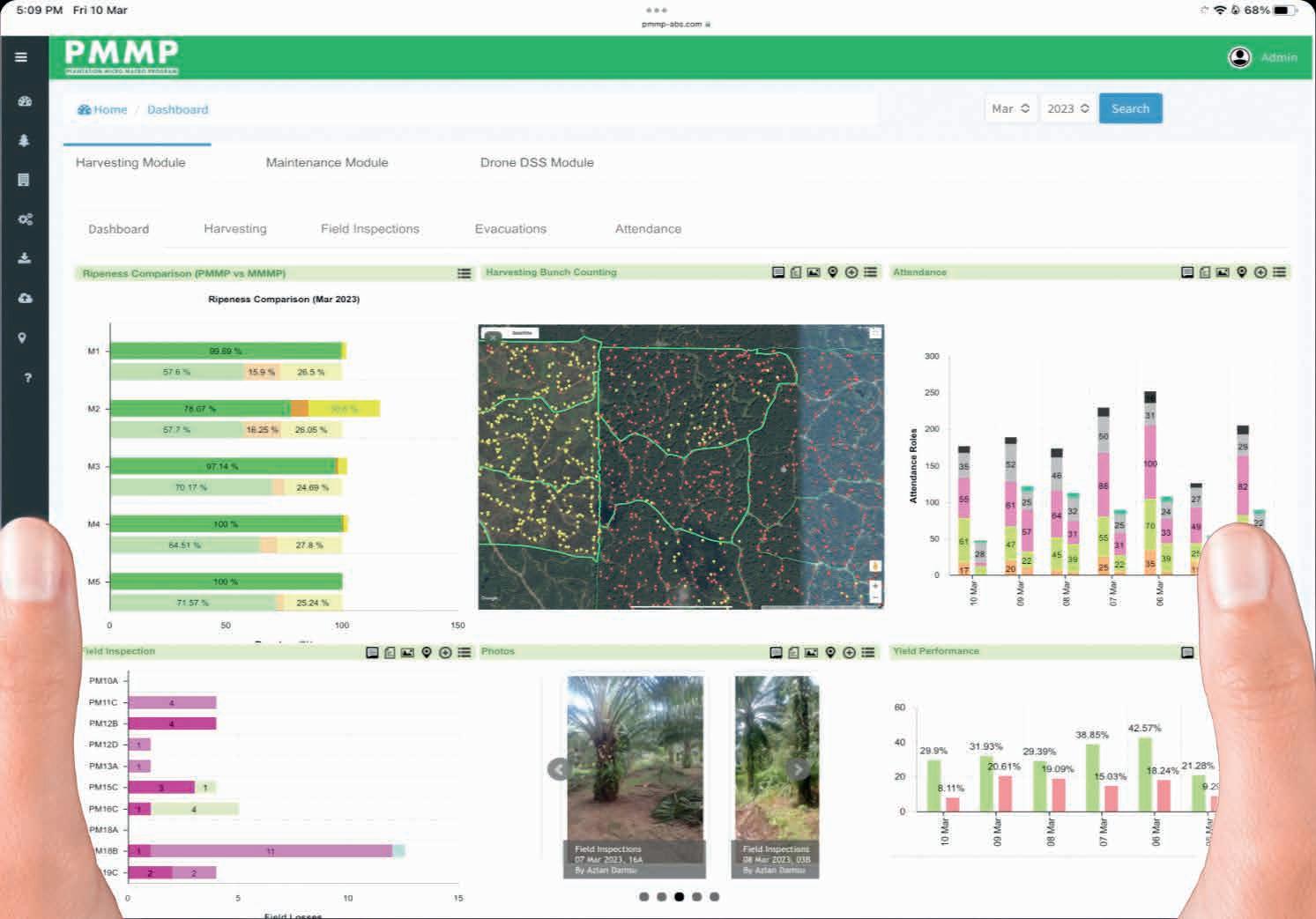

HTTPS://ABS.GLOBAL ReadytotakeyourPlantationandMill tothenextlevel? Contactustodayandexperiencethe powerofournext-generation DigitalTransformation isthefutureofpalmoil. AtABSGlobal,weempoweryourbusiness withadvancedsolutions. FromReal-TimeDatatoAnalytics,wehelpyouachieve efficiency, sustainability and profitability Partnerwithusandtransformyouroperationsforthefuture RevolutionizePalmOilBusines WithReal-TimeInsights&Actions: InformedDecisions,CompetitiveAdvantage









































































































































































































































 Inke van der Sluijs Director, Market Transformation
Inke van der Sluijs Director, Market Transformation











































